
|
#957 (3/9/24)

|
|
BY TONY FOURNIER |
SYDNEY NATHAN — KING RECORDS
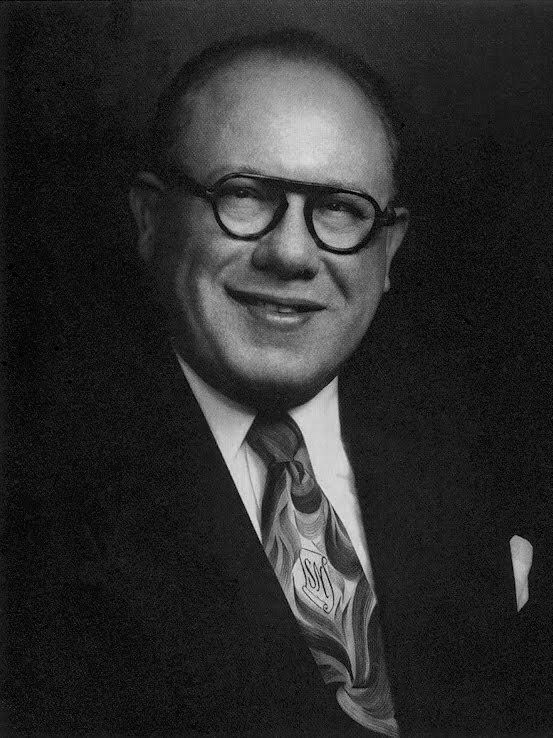
|
Above: Sydney Nathan, owner and president of King Records located in Cincinnati, Ohio.
The first two records (#500 and 501) on the King label were released in November 1943. They were both country and western (aka "hillbilly"). Their pressings were done by outside sources as Nathan did not yet have any manufacturing facilities. That changed about a year later when King Records now had completed a comprehensive manufacturing plant. At about this time, Nathan also entered the rhythm and blues market, using the Queen label for that endeavor.
Nathan first used the King label exclusively for hillbilly music. When Queen folded in 1947, rhythm and blues releases moved over to the King label. Hillbilly continued to use the maroon label, while r&b went to a blue label, each continuing to use their own original numbering system.
In 1950, Federal Records was formed as an r&b subsidiary label. And, in February 1951, King acquired DeLuxe Records as another subsidiary, using it for "rock and roll". Neither of these two labels will be included in this specific article.
THE BILLBOARD, November 20, 1943:
KING RECORDS, CINCINNATI, ANNOUNCES FIRST RELEASES
CINCINNATI—Sid Nathan of the King Record Company here, which recently entered the recording and distributing field, concentrating solely on hillbilly tunes, this week announced his firm's first releases.They are "When Mussolini Laid His Pistol Down" and "Two-Time Annie", waxed by Bob McCarthy, and "You'll Be Lonesome, Too" and "Steppin'-Out Kitty", by the Sheppard Brothers.
THE BILLBOARD, November 4, 1944:
CINCY'S NEW DISK PLANT OPERATORS; 'BILLYS SPECIALTY
CINCINNATI—King Record Company, national distributor of phono disks and which for the last year also held the dubious title of manufacturer, with its pressings made by outside firms, is going into the manufacture of records on its own, Sydney Nathan, firm's president and general manager, announced this week.The King organization, with offices at 1351-53 Central Avenue here, has rented a spacious plant at 1540 Brewster Avenue here in which is being installed a modern fully equipped plating plant where the firm will be able to turn out 24 pieces (masters) per day, according to Nathan.
Stephan J. Shaw, until recently with the MacGregor Studio on the West Coast, is supervising installation of equipment and will be in charge of the King record-making plant upon its completion. Shaw has had twenty years' experience as a plater.
In speaking of the firm's decision to enter the disk manufacturing end of the business, Nathan said: "The small manufacturer of records has been forced to rely upon the mercy of a few firms for his source of records. Anybody who had two acetates and had the courage to call himself a manufacturer could go to any one of these sources and eke out a few records now and then. I was one of these many for the past year. It was up to me to make up my mind to either get out of the record manufacturing business or do something about it."
"We will have a complete milling department," Nathan says, "in which we will mill all our own biscuits, using formulas that will guarantee long playing life for our records. We have 14 presses which will give us a minimum output of 10,000 records per day."
"We will manufacture, under the King label, hillbilly records exclusively. Among the artists already signed with us exclusively are the Carlisle Brothers, Delmore Brothers, Grandpa Jones, Bill and Evalina, Hank Penny and Cowboy (Pappy) Copas.
The numbers we record will be original songs either owned outright by us or in which we receive the first recording rights, and we plan to create a market for our own numbers.
We also will manufacture, under another label [Queen], a small catalog of sepia and hot jazz disks. About November 1, we will release the following numbers by Chubby Jackson's orchestra: "Popsie"; "Don't Get Too Wild, Child"; "I Gotcha Covered"; and "Bass Face".
"All distribution will he handled by us direct from our factory. Our records will retail at 75 cents plus tax, and wholesale at 49 1/2 cents, including tax."
LISTEN (Windows Media Player):
"I Gotcha' Covered" - Chubby Jackson Sextet - Queen 4101-A - 1944.Neal Hefti is playing trumpet on this record. You probably know him as the orchestra leader appearing on every major label (or its subsidiary) in the 1950s. Among his many achievements, Hefti also wrote music for "Batman", the 1960's TV series.
CINCINATTI POST, November 15, 1944:
Sinatra may come and Crosby may go, but Sydney Nathan is putting his chips on hillbillies.Here in Cincinnati, despite the shortages of materials and machines and the stonewall stand of Mr. James Petrillo, Mr. Nathan is opening his own recording factory. And he will record nothing but the "gittar and stone jug" rhythms of the mountain boys. "You may not like what's on 'em," he says, "but I'm going to make the best records produced today."
Mr. Nathan, Howard and Evelyn Kessell are associated in the company, which is opening a plant at 1540 Brewster avenue. They will produce 10,000 records a day, every one of them hillbilly tunes.
Why hillbillies? "It's silly for me to buck the big boys. (Victor, Columbia, Decca.) I can't get Crosby, so why should I try to find somebody who just sounds like Crosby? "Besides, I'm going into a field the big companies have ignored."
"There are so many types of recordings. Since the war started, the big companies have had to concentrate their production on the main types. They've left the hillbilly field alone. I figure they are producing only 25 per cent of the records that can be sold. "So I'm going to make hillbilly records and I hope to keep that business after the war."
Mr. Nathan has been distributing his own recordings (King Records) for some time, but he never has actually manufactured them. There are only four or five manufacturers outside the big name firms which have a virtual monopoly over the field. Materials for records aren't so scarce as they once were. Mr. Nathan says the Cincinnati plant will turn out the equivalent of pre-war recordings.
The biggest handicap is machinery. Because the customer potential is so small, machine firms build recording equipment only to order. In wartime, that's impossible. King company got around that.
They found hydraulic presses intended for woodworking and re-designed them to produce records. A relatively unskilled workman can operate the single-control machines which turn out a record every 45 seconds. King company has a capacity of 10,000 records daily. About 70 employees will be on hand when production starts late this month.
Stars of the King records will be the Carlisle brothers, the Gilmore brothers, Grandpa Jones, Bill and Evaline, Cowboy (Pappy) Copas, and others of the hillbilly clan. Their records will sell for about 75 cents.
There will be no difficulty with Mr. Petrillo, czar of the American Federation of Musicians, whose feud with Victor and Columbia blocked recordings from those companies for over two years. AFM demands that manufacturers pay the union a royalty on each recording. Decca and most of the small manufacturers signed months ago, as did Mr. Nathan.
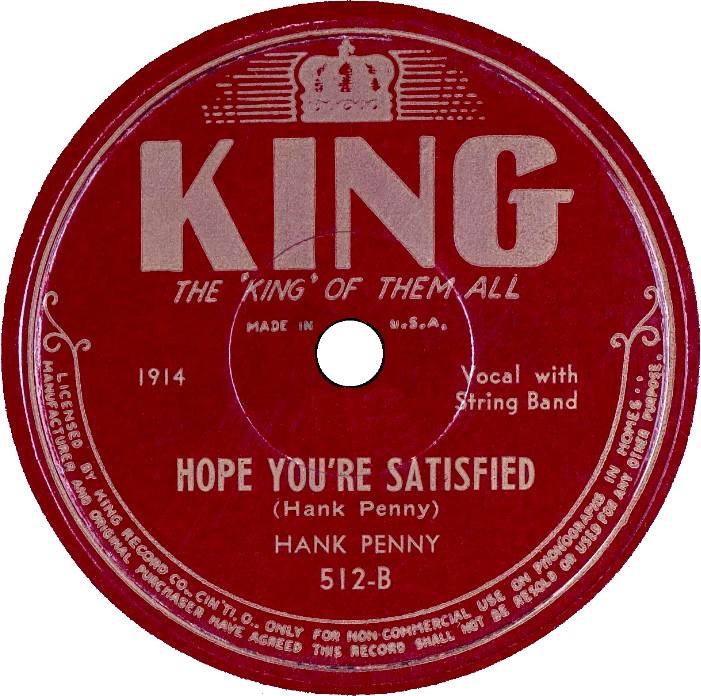
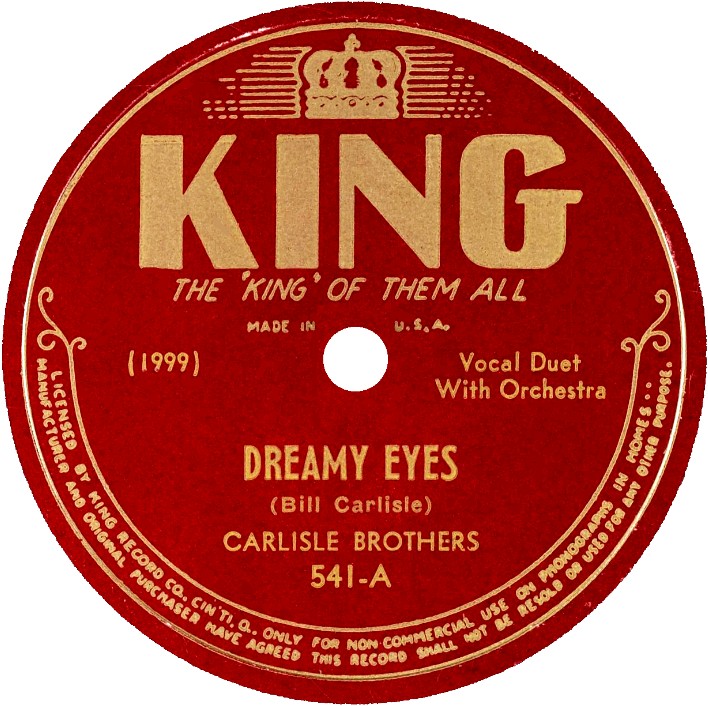
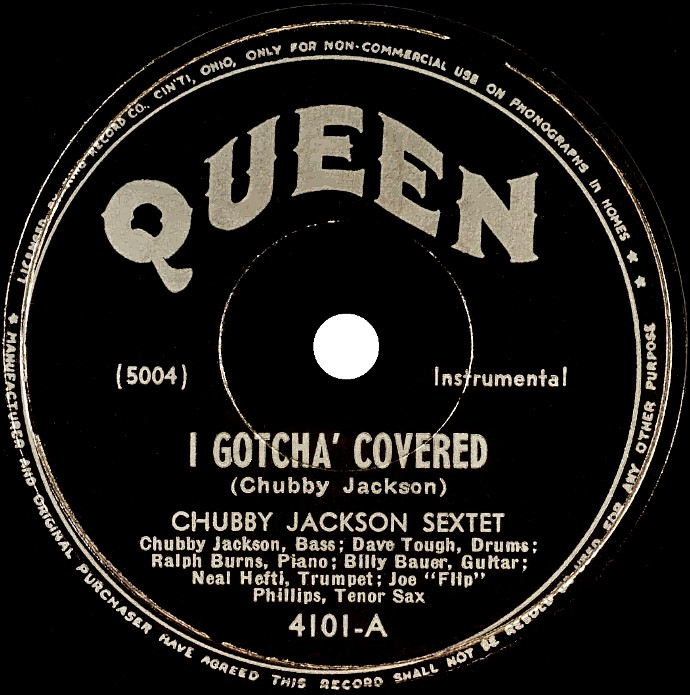
If interested, there are thirteen traditional Country and Western CDs available from this website. All tracks made from 78-rpm records.
Sound quality is excellent. (Will open in a separate window)
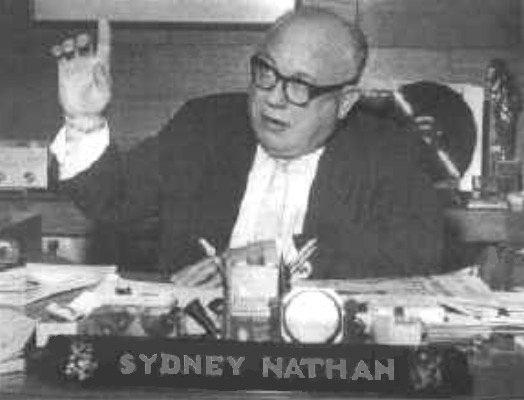
At Left: Sydney Nathan pointing upward while working at his desk.
CASH BOX, June 28, 1952: THE RISE OF SYD NATHAN AND KING RECORDS
....How did Syd Nathan make the jump from wholesaling radios to producing records?
It seems he knew a juke box operator who owed him $6. Unable to re-pay Nathan, the operator offered him 300 used records. Nathan, put a sign in his store window offering the records for sale at 10c each. The first afternoon he sold 180 records and from then on he was in the record business.
Records were hard to get during the last war. Nathan conceived the idea of getting some hillbilly singers together, cutting some records, and geting someone to press them for him. Material shortages were a terrific handicap and the whole process of hiring the pressing done so costly, that he finally decided to set up a little plant of his own with one or two presses.
From that start grew King Records Inc., and its Royal Plastics Manufacturing Division, now among the top ten producers of records in America....
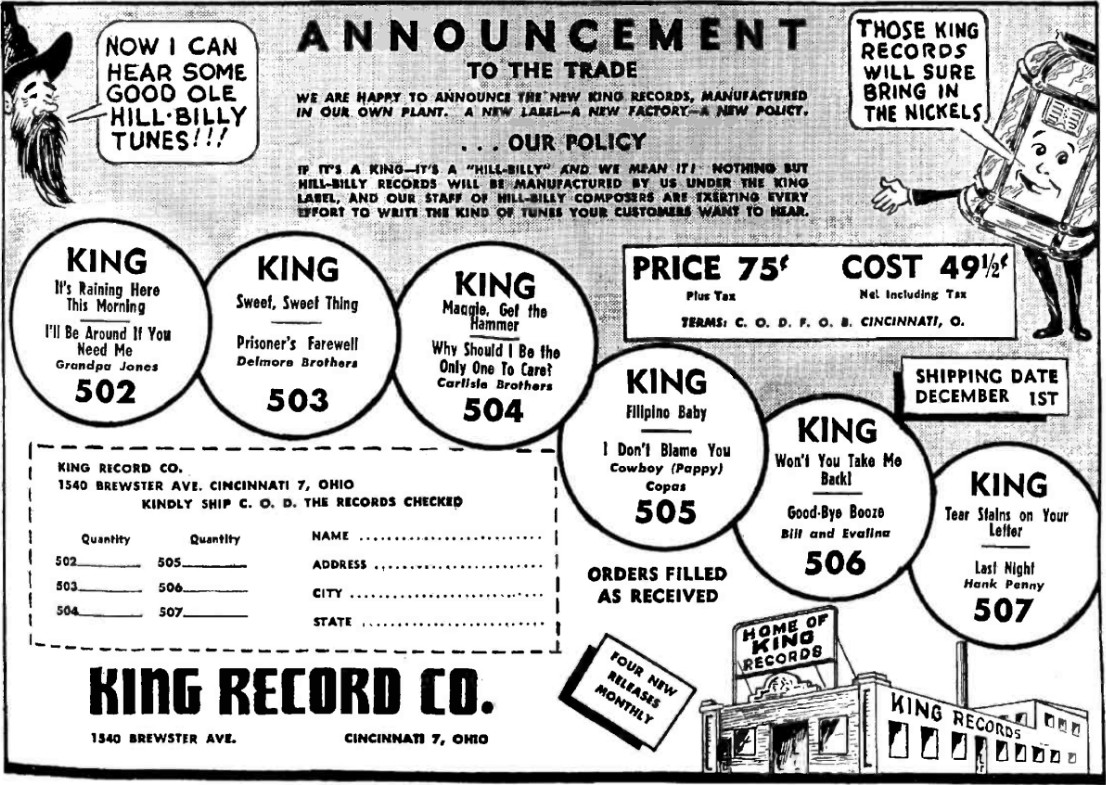
|
Above: THE BILLBOARD, 1944 MUSIC YEARBOOK.
NOTE: It includes a very nice depiction of the King Records manufacturing plant in 1944.ANNOUNCEMENT TO THE TRADE
We are happy to announce the new King Records, manufactured in our own plant. A new label—A new Factory—A new policy.
...OUR POLICY
If it's a King—It's a "Hill-Billy" and we mean it! Nothing but Hill-Billy records will be manufactured by us under the King label, and our staff of Hill-Billy composers are exerting every effort to write the kind of tunes your customers want to hear.
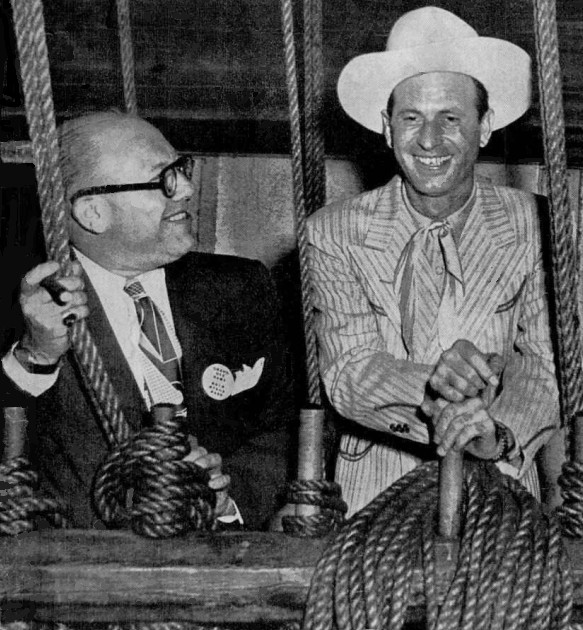
|
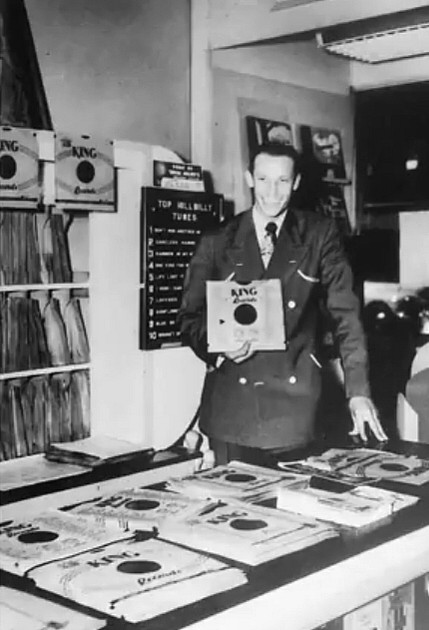
|
Above Left: THE BILLBOARD COVER, August 21, 1948:
(CAPTION) A steady tenant of The Billboard's most played and best selling folk-record charts is Cowboy Copas (right), here (at the Grand Ole Opry) with Sydney Nathan, president of King Records (with which diskery the Cowboy has been associated since its inception).... Pic was shot when Copas signed a new ten-year contract with King Records....That rope under Copas's hands, by the way, ain't no lariat. It's the backstage rope at the "Opry" theater, and it's an 80-year-old hunk of hemp, believe it or leave it.
Above Right: Photo of Hawkshaw Hawkins, a country and western singer, who first recorded for the King label in July 1946. His final King recording session was in January 1953. He moved to Columbia and RCA Victor with many records released on those labels starting in 1953. He later returned to King Records.
He was killed in a plane crash, along with Patsy Cline and Cowboy Copas, in 1963.
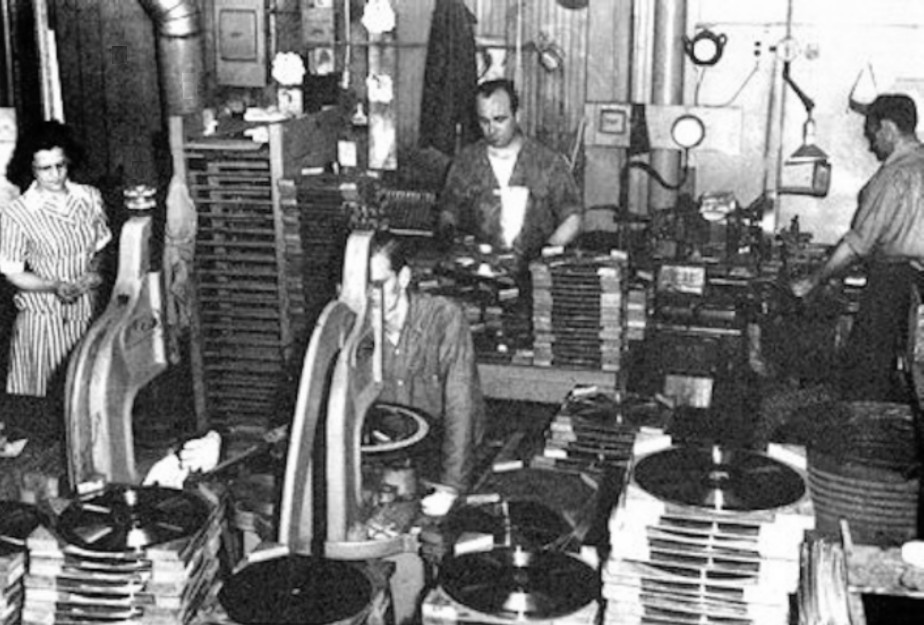
|
Above: Inside the original King Records manufacturing plant.
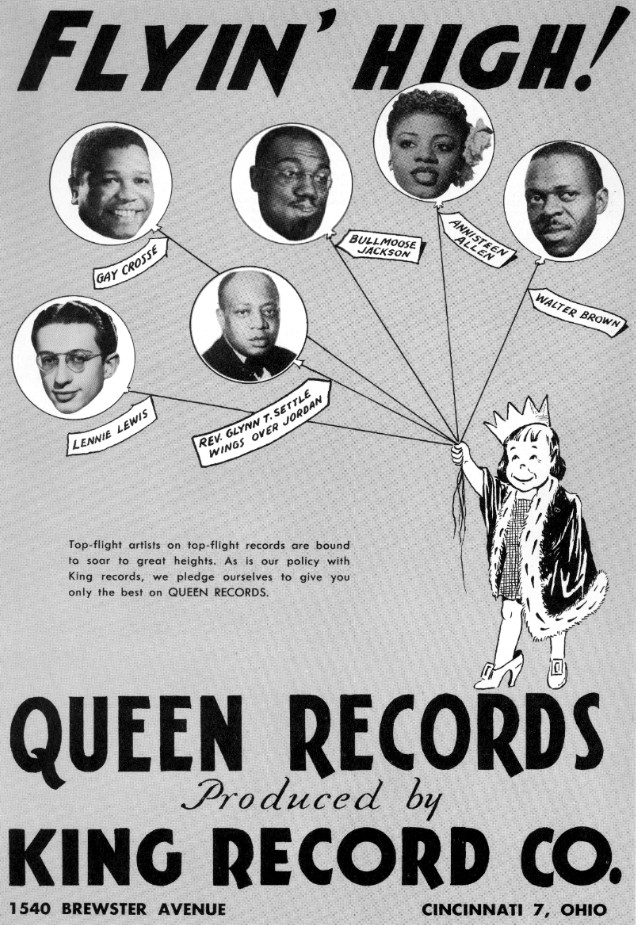
|
Caption on above left clipping: "Top-flight artists on top-flight records are bound to soar to great heights. As is our policy with King Records, we pledge ourselves to give you only the best on QUEEN RECORDS."
Lennie Lewis and Gay Crosse were orchestra leaders; Walter Brown was a blues singer; Bull Moose Jackson and Annisteen Allen are spotlighted in the next two sections of this webpage.
BULL MOOSE JACKSON
Bull Moose Jackson, from Cleveland. Ohio, was a singer and saxophone player. He had records released on Super Disc (1945), Decca, with Lucky Millinder's Orchestra (1946), M-G-M (1948), and Capitol, with Big Sid Catlett's Orchestra (1948).
But his main labels were Queen and King. Bull Moose had the first record issued on the Queen label, his version of "Honey Dripper", in 1945. He switched over to King in 1947 with records released on that label until 1955.
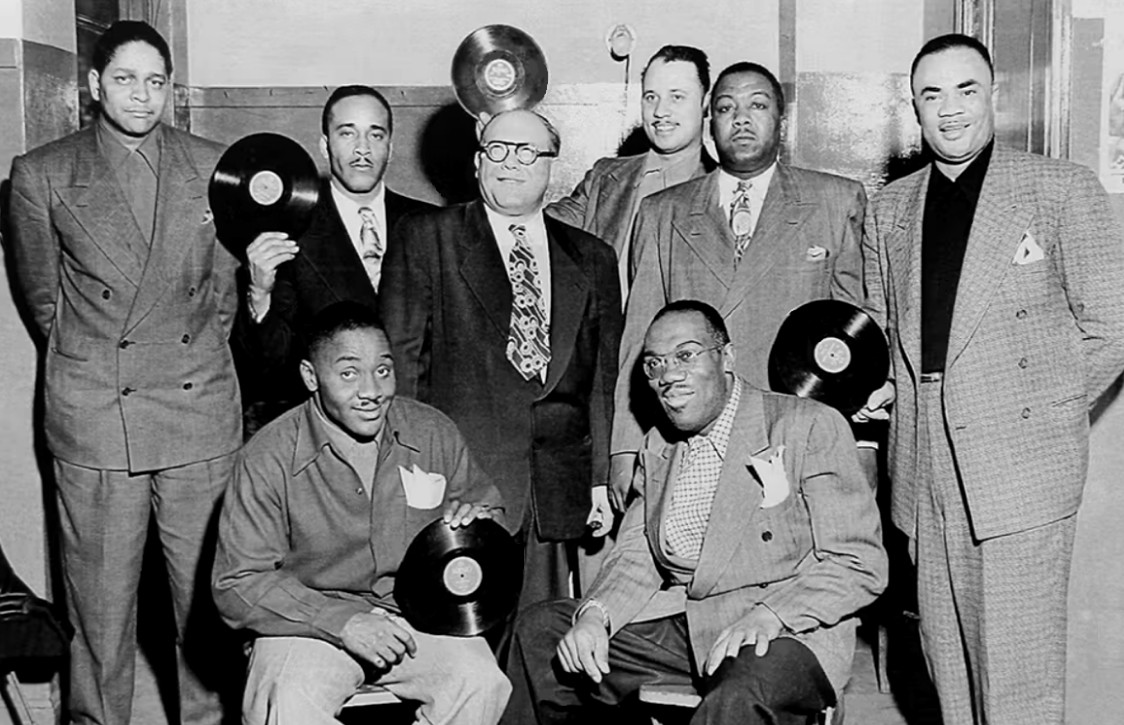
|
Above: Sydney Nathan (center) with Bull Moose Jackson (seated at bottom right) And His Orchestra.
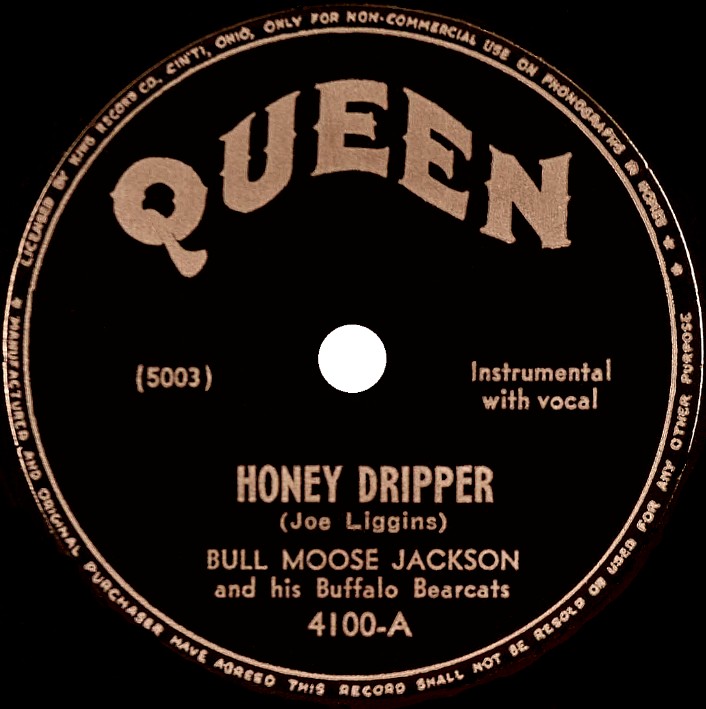
|
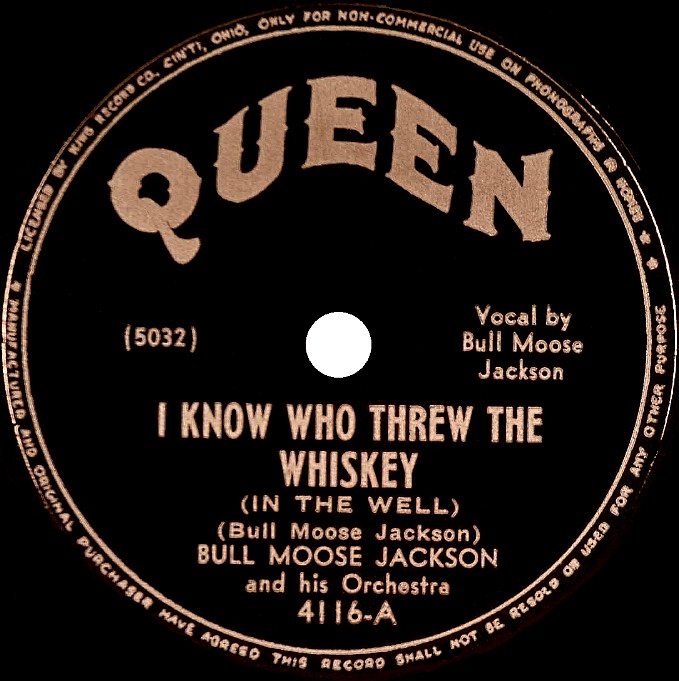
|
Above Left: Label image of Queen 4100-A, released in September 1945. Composer Joe Liggins' orchestra had the original version of "Honeydripper". Other artists with versions of this song in 1945 are Jimmie Lunceford Orchestra (Vocal by The Delta Rhythm Boys), Sammy Franklin And His Atomics, Cab Calloway Orchestra, and Roosevelt Sykes And His Piano.
Above Right: Label image of Queen 4116-A, released in 1946. "I Know Who Threw The Whiskey" was re-issued on King 4244-A in 1948.
LISTEN (Windows Media Player):
1. "Honey Dripper" - Bull Moose Jackson And His Buffalo Bearcats - Queen 4100-A - 1945.
2. "I Know Who Threw The Whiskey (In The Well)" - Bull Moose Jackson And Orchestra - Queen 4116-A - 1946.BOTH SONGS played in sequence.
The Billboard Review (6/22/46): BULL MOOSE JACKSON
"I Know Who Threw The Whiskey In The Well" Queen 4116
Chanted like a spiritual, the lyrics on the "Whiskey" side concern a big commotion at a prayer meeting. Nothing be-bop, but straight on the order of "Amen" with a dash of "Mrs. Murphy's Chowder". Should hold interest for more than just race locations.
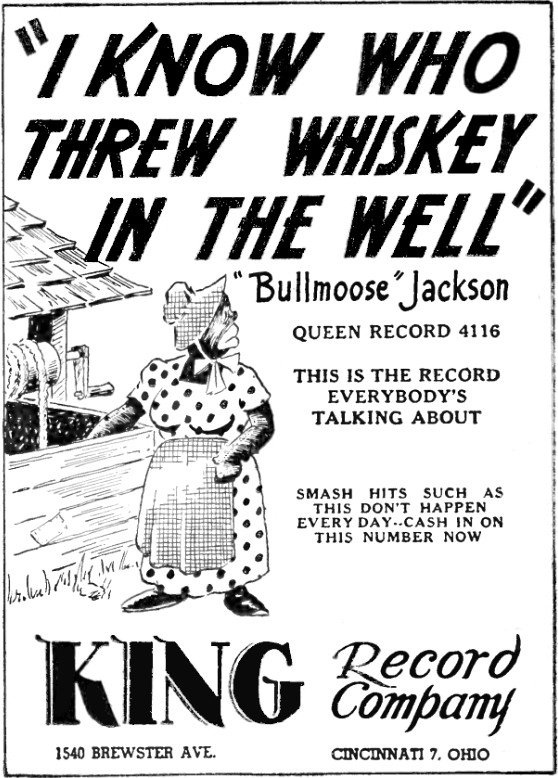
|
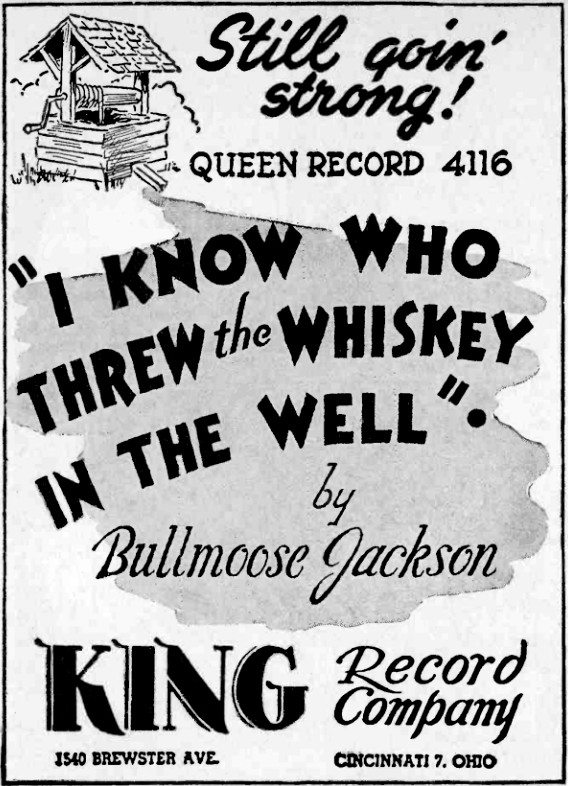
|
Above Left: THE BILLBOARD, July 13, 1946. Above Right: THE BILLBOARD, August 24, 1946.
EXTRA RECORD — I KNOW WHO THREW THE WHISKEY IN THE WELL The original "Who Threw The Whiskey In The Well" was recorded by a novelty outfit, Freddie "Schnickelfritz" Fisher And His Orchestra, on November 10, 1941 and released on Decca in May 1942. The next version was by "Doc" Wheeler And His Sunset Orchestra, vocal by "Doc" Wheeler And The Hardaway Four, recorded on March 30, 1942 and released on Bluebird in July 1942.
That was followed three years later by Wynonie Harris with Lucky Millinder's Orchestra on Decca. Bull Moose Jackson is playing the sax on this one. Millinder's version was a big hit for him. The song was composed by Eddie DeLange and Johnny Brooks.
The "answer" record "I Know Who Threw The Whiskey In The Well" was first done by Bull Moose Jackson on the Queen label in 1946. The composer shown on Bull Moose's record is "Bull Moose Jackson" (confirmed at BMI.com). The Four Blue Jackets' answer record incorrectly shows "Millinder" as composer.
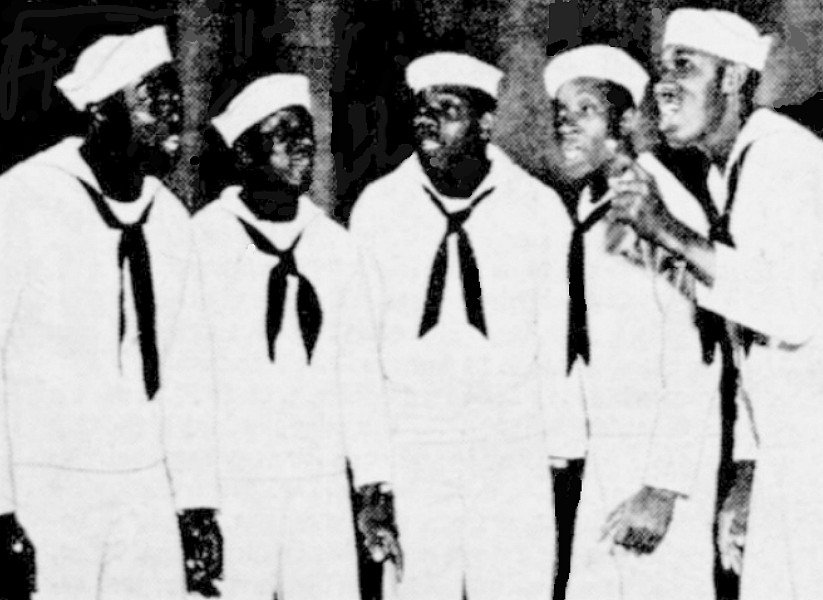
|
Above: CINCINATTI POST, November 15, 1944:OHIO FURNISHED NAVY THIS QUARTET
The Bluejacket quartet, and its accompanist, appear every Saturday night on the "Men o' War" radio program heard over the Columbia Broadcasting System from the U.S. Naval Training Center, Great Lakes, Ill.Above appearing from left to right are Seamen Second Class William Bryant, Durant Bryant, Wilbert Wellington, accompanist; Joseph Bryant, and William Graham. All hail from Dayton, Ohio, except Wellington, who is a native of Des Moines, Iowa.
(NOTE: Disco-File lists Durand "Doc" Bryant, Joseph Bryant, Toby Bryant, and William Bryant as the performers on all of the Mercury releases. The Chicago Defender dated 11-9-46 gives the names as William Graham, Joseph Durant, Toby Bryant, and Jimmy Holmes. Graham is the composer of the song on the flip-side of this record.)
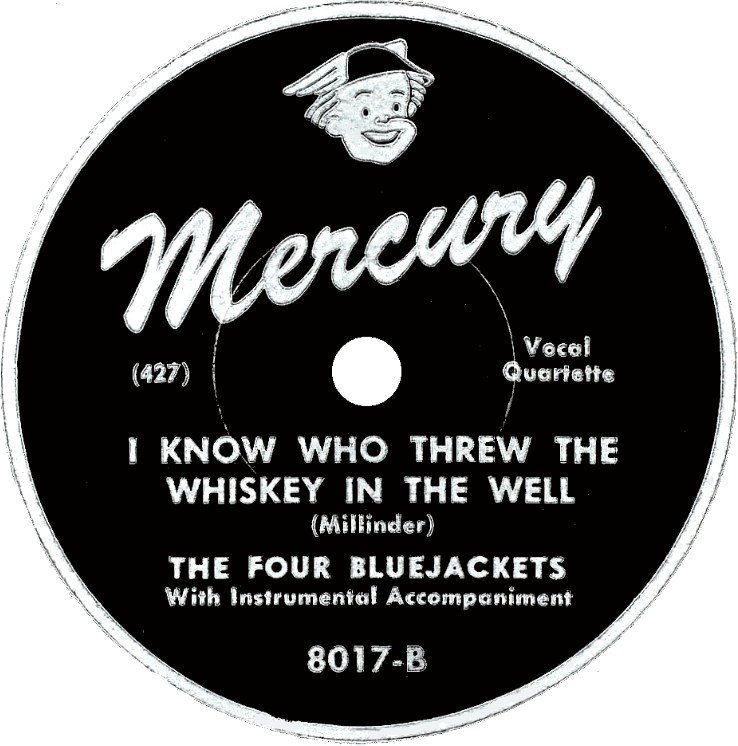
|
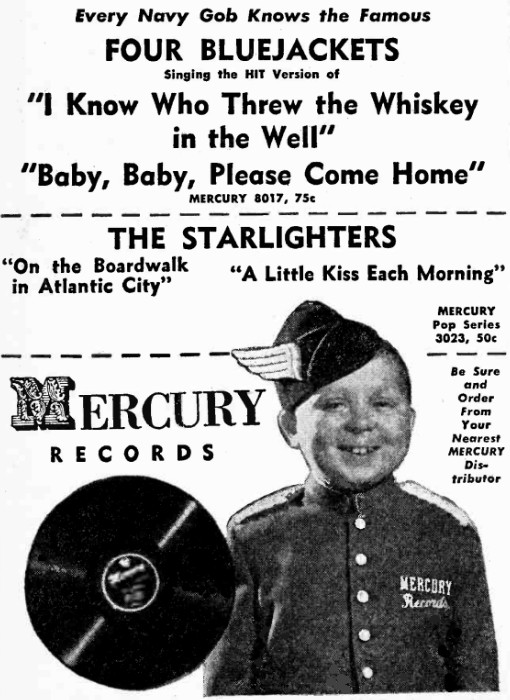
|
Above Left: Label image of Mercury 8017-B, released in August 1946. The Four Bluejackets had four records on the Mercury label (1946-1947). This was their only non-spiritual one. Above Right: THE BILLBOARD, August 10, 1946.
At Direct Right: Photo of The Four Bluejackets with, apparently, their accompanist.
The Billboard TV Review (3/9/46):
THE FOUR BLUEJACKETS — WBKB, Chicago, Ill.
....As a result of seeing the Blue Jackets' Quartet tonight, we predict that in the future this Negro singing group which used to be part of the Navy's Blue Jackets' Choir at Great Lakes, Ill., will have a bright future in radio and television.Proof that they are on their way up is the fact that they made some sides for Mercury Records on Friday (3/1/46). Tonight's show proved that they had video presence. Radio ought to catch on soon.
The Billboard Review (8/10/46):
THE FOUR BLUEJACKETS
"I Know Who Threw The Whiskey In The Well" Mercury 8017-B
The quartet captures the "spiritual" fervor and rhythmic kick of the "Whiskey" ditty and the version runs a close second to Bull Moose Jackson's current hit version on the boxes. Use of the bass voice to carry the melody thru out, however, tends to make the harmonies a wee bit monotonous.... Current popularity of "Whiskey" will help sales along.Cash Box Review (8/26/46):
THE FOUR BLUEJACKETS
"I Know Who Threw The Whiskey In The Well" Mercury 8017-B
...."I Know Who Threw The Whiskey In The Well" has a lot of pep. The pattern is that of a fast spiritual with a faint tinge of boogie in the background. Itís a novelty tune with a surprise ending.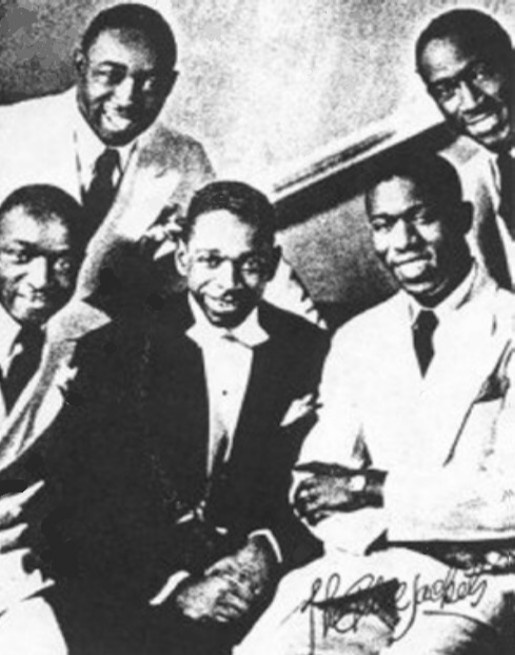
LISTEN (Windows Media Player):
1. "I Know Who Threw The Whiskey In The Well" - The Four Bluejackets - Mercury 8017-B - 1946.
(BONUS) 2. "Who Threw The Whiskey In The Well?" - "Doc" Wheeler And His Sunset Orchestra (Vocal By "Doc" Wheeler And The Hardaway Four) - Bluebird B-11559-A - 1942.
(BONUS) 3. "Who Threw The Whiskey In The Well?" - Lucky Millinder And His Orchestra (Vocal By Wynonie Harris) - Decca 18674 A - 1945.ALL THREE SONGS played in sequence.
MORE BULL MOOSE JACKSON
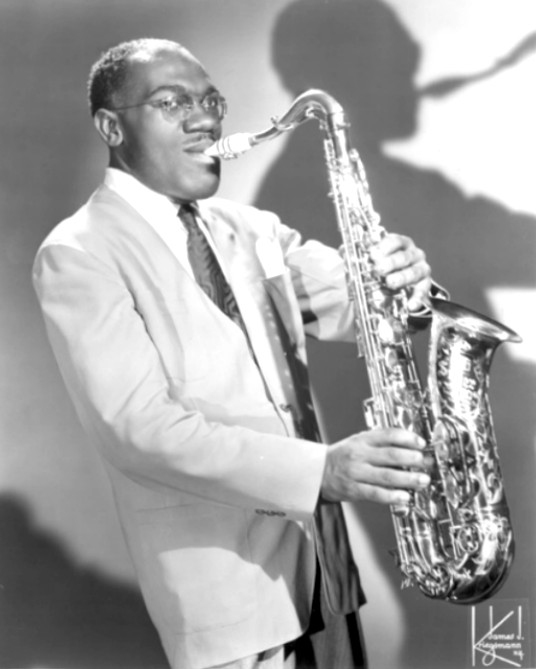
|
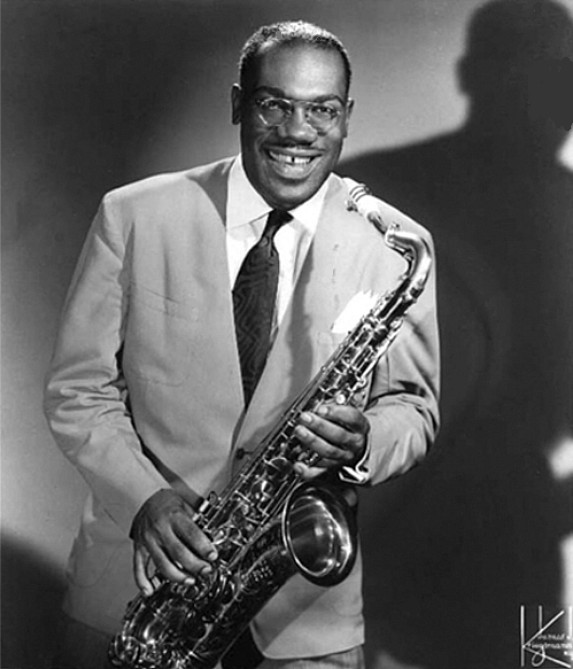
|
Above: Two photos of Bull Moose Jackson.
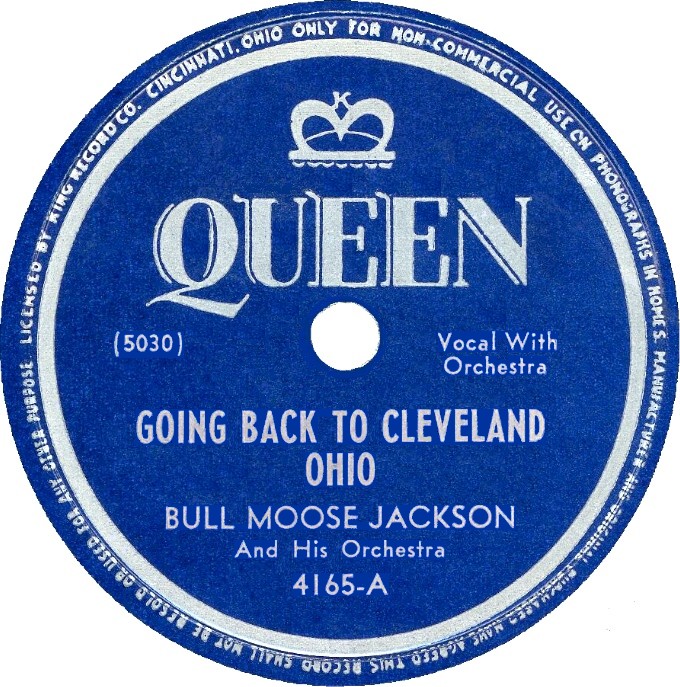
|
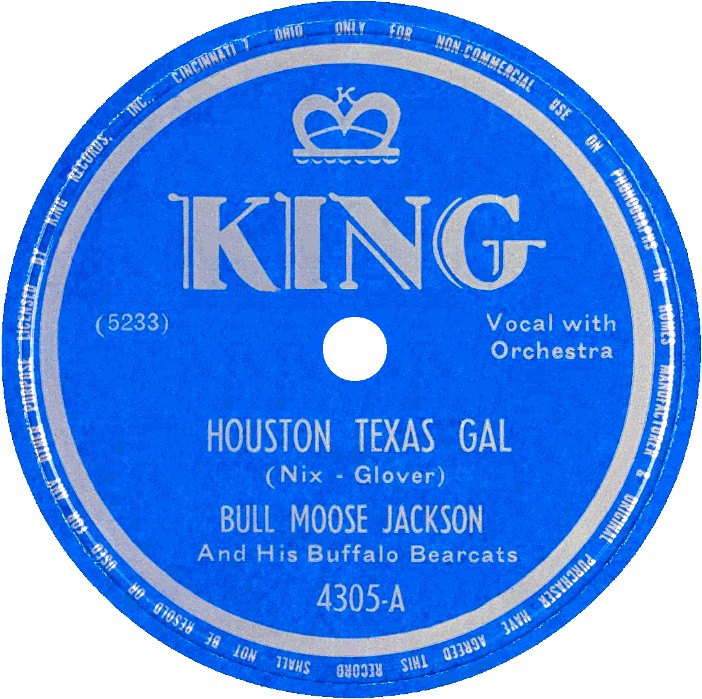
|
Above Left: Label image for Queen 4165-A, released in 1947. No composer shown on the label for this song, nor at BMI or ASCAP. The flip-side is not Bull Moose Jackson. Above Right: Label image for King 4305-A, released in 1949. When the Queen label was discontinued and that group of artists moved over to King, the Queen numbering sequence was carried over with them.
"Houston Texas Gal" was composed by Sally Nix and Henry Glover, King's a&r man and designated composer, and Sydney Nathan's right-hand man. The flip-side, "Come Back To Me" was written by Lucky Millinder amd Glover.
BMI.com credits Henry Glover with 633 work titles, 18 of which are "BMI Award Winning Songs". He wrote twenty-one songs with Millinder and eighteen with Sally Nix. There are also fifty-five songs written with Sydney Nathan. Now who would have thought Nathan was such a prolific songwriter (said with tongue-in-cheek)?
LISTEN (Windows Media Player):
1. "Going Back To Cleveland Ohio" - Bull Moose Jackson And His Orchestra - Queen 4165-A - 1947.
2. "Houston Texas Gal" - Bull Moose Jackson And His Buffalo Bearcats - King 4305-A - 1949.
3. "Come Back To Me" - Bull Moose Jackson And His Buffalo Bearcats - King 4305-AA - 1949.ALL THREE SONGS played in sequence.
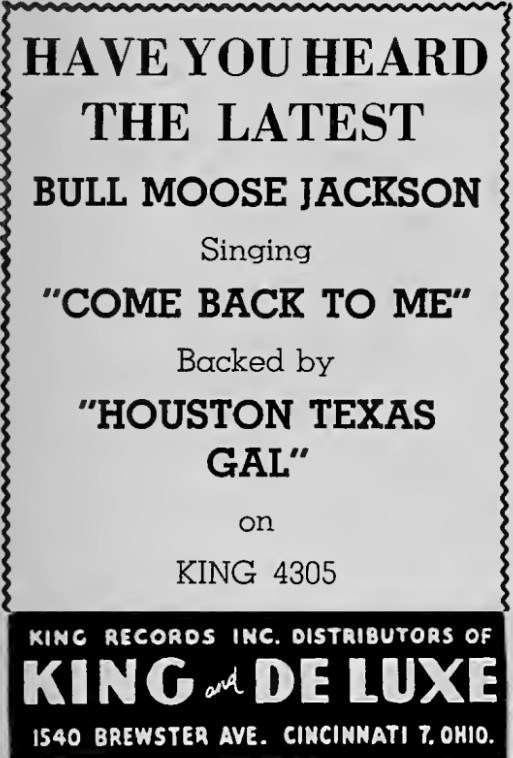
Above: CASH BOX, September 17, 1949.
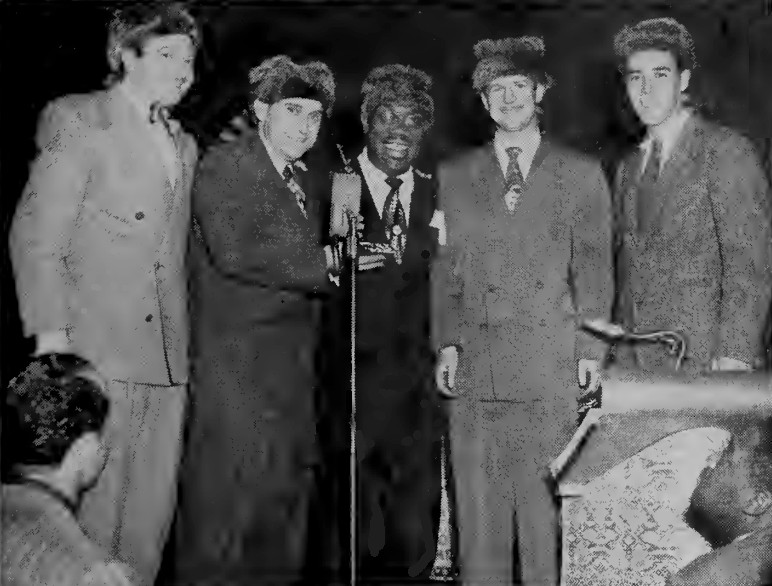
Above: CASH BOX, May 21, 1949: MUSIC AWARD PRESENTED TO BULL MOOSE JACKSON
HOLLYWOOD—Loaded for cats were Bull Moose Jackson, King Records star, and Cash Box representative Leo Simon, who presented him with the 1949 Music Award for "I Love You, Yes I Do" at the Avodon Ball Room in Los Angeles, as King Record salesman Carlo Grumberg, (left), King branch manager A1 Sherman, and office manager Ed Guerin also borrowed raccoon derbies from the Bearcat crew for the joyous occasion. Witnessing the event were some 2000 of the gayest and hepest cats ever to pack the big downtown dance hall.(NOTE: Bull Moose's orchestra was named The Buffalo Bearcats.)
ANNISTEEN ALLEN
Annisteen Allen was a featured vocalist with Lucky Milliner's orchestra, joining him in 1945. After leaving him in 1954 (having recorded on the Decca, RCA Victor, and King labels), she moved to Capitol, scoring a minor hit with "Fujiyama Mama" in 1955.
NEW YORK, October 5, 1946:
....Annisteen Allen was virtually unknown until last year, when she was recommended to Lucky Millinder by Louis Jordan. Since given her chance, she has been a smash hit wherever she has appeared.
Click HERE for an article about Annisteen Allen by Marv Goldberg. (Will open in a separate window)
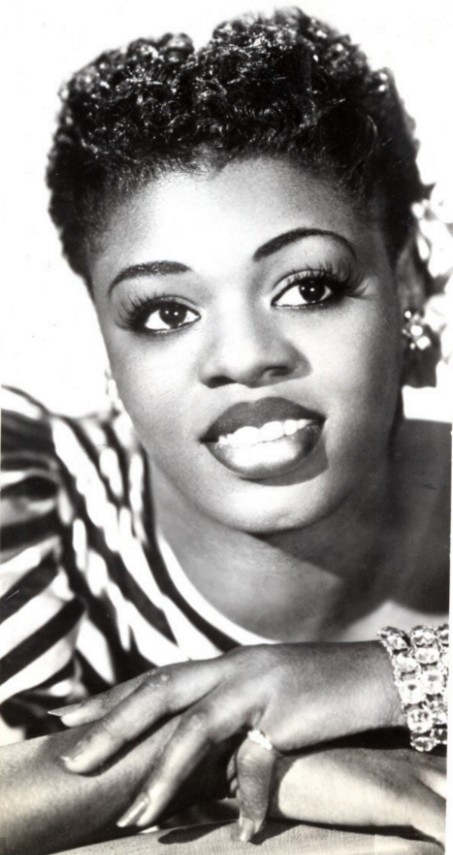
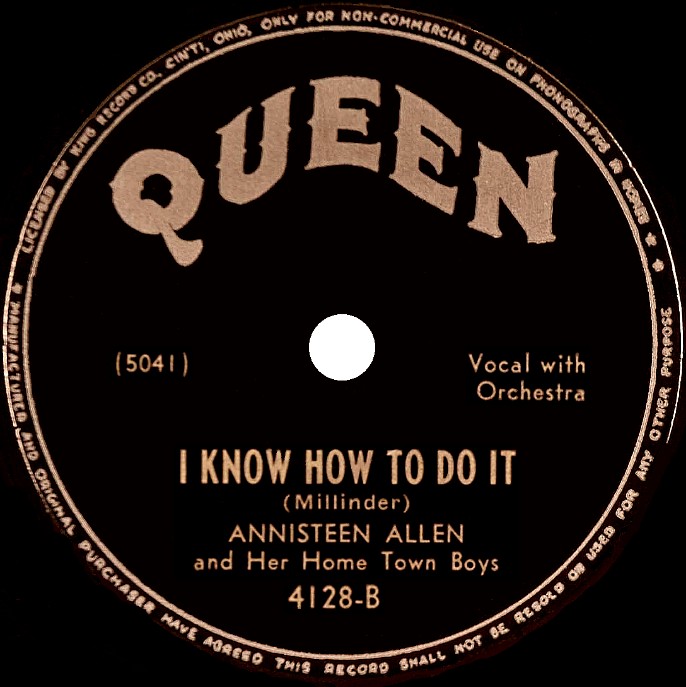
At Left: Photo of Annisteen Allen. (Photo is courtesy of Paul Ressler.)Above: Label image for Queen 4128-B, released in September 1946. This is her fourth record of four on the Queen label. She then recorded for the King label.
The label credits Lucky Millinder as composer, but the title is not listed at the BMI or ACSCAP websites. The flip-side, "Arkansas", shows "Millinder-Bellin", but again not listed with BMI or ASCAP.
LISTEN (Windows Media Player):
1. "I Know How To Do It" - Annisteen Allen - Queen 4128-B - 1946.
2. "Arkansas" - Annisteen Allen - Queen 4128-A - 1946.BOTH SONGS played in sequence.
The Billboard Review (9/21/46):
ANNISTEEN ALLEN
"Arkansas"/"I Know How To Do It" Queen 4128
Bass and rhythm kick off top side, saxes take up the chant for a stanza, and then Annisteen comes in for the lyrics which constantly repeat the line "Rock Me in Little Rock, Arkansas." Tenor sax solo, and some ensemble lyricizing which is a wee bit sour, follow.Better side for the race location jukes is the peppy, "I Know How To Do It", on the flip-over.
Tune, like its mate, is a Lucky Millinder composition and has been waxed before—but seldom with as much enthusiasm. Side, however, tends to be slightly marred by the roughness and varied quality of the band.
"Arkansas" ditty strictly of local interest; other side will get play on race boxes.
At Direct Right: Lucky Millinder and Henry Glover, seemingly interrupted while working on a new song.
CASH BOX, July 1, 1950: KING RECORDS SIGN LUCKY MILLINDER
CINCINNATI—King Records of Cincinnati, Ohio, this week announced the signing of orchestra leader Lucky Millinder to a long term pact. Millinder is a former Decca and Victor recording artist.Lucky Millinder is the composer of many of the big hits of the past and present which includes "Shorty's Got to Go", "D' Natural Blues", "Let It Roll", and "Sweet Slumber".
(NOTE: Henry Glover was co-composer of "D' Natural Blues" with Millinder.)
In conjunction with his booking and promotion manager, King is planning an extensive promotion campaign on this new artist. Millinder has already recorded his first session with King and the company is rushing the first platter to the market.
His first release will be "Let It Roll Again" backed by "My Little Baby", and will be available shortly.
(NOTE: This record is King 4379 with vocal by sax player Big John Greer. Both sides were composed by Henry Glover and Sally Nix.)
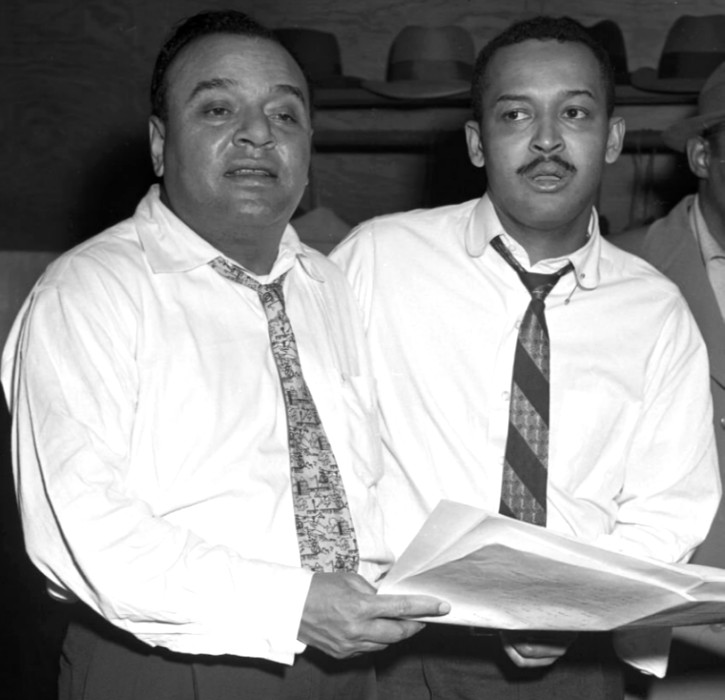
Above Left: King Records publicity photo of Lucky Millinder, "recording exclusively for King". Above Middle: Label image for King 4453-A, released in 1951. "Bongo Boogie" was composed by Henry Glover and Sally Nix.
The flip-side of "Bongo Boogie" is "I'm Waiting Just For You" by the Lucky Millinder Orchestra with vocals by Annisteen Allen and John Carol. It was written by Carolyn Leigh and Henry Glover. The song was also released by Otis Williams And His Charms on DeLuxe (a subsidiary label of King Records) in 1957. It was also available on records by several country & western artists.
Above Right: Label image for King 4622, released in 1953.
Both sides of this record were written by Henry Glover and Fred Weismantel. Both of them were King Records a&r men at the time.
At Direct Right: In photo, second from left: Henry Glover; third from left: Sally Nix; far right: Lucky Millinder. If anyone knows the names of the other two, please contact me.
Cash Box Review (5/12/51):
LUCKY MILLINDER
"I'm Waiting Just For You"/"Bongo Boogie" King 4453
Lucky Millinder comes through with a couple of interesting sides. The upper half features a duet by Annisteen Allen and John Carol on a very slow number while on the bottom end Annisteen goes it alone singing out the lyrics to a dance. Ops oughta tune in.The Billboard Review (5/9/53):
ANNISTEEN ALLEN — King 4622
Trying To Live Without You (79) Miss Allen has material worthy of her talents here and she projects the blues with conviction. Side has lots of appeal and could build with exposure.
My Baby Keeps Rollin' (75) The thrush sells this one ably. Effort has a persistent beat and It could attract some juke loot.(NOTE: Ratings had a range of 0-100 with 70-79 considered as "good".)
CASH BOX, August 24, 1954:
Capitol Records is moving into the rhythm and blues field again but will not issue its r.&b. platters on a separate label or even series number. This week the label signed thrush Annisteen Allen and blues singer Pepper Neale and is about ready to announce the signing of a fairly well-known vocal group, and a band....(NOTE: The "fairly well-known vocal group" was probably The Five Keys, who had their first recording session with Capitol on August 30, 1954.)
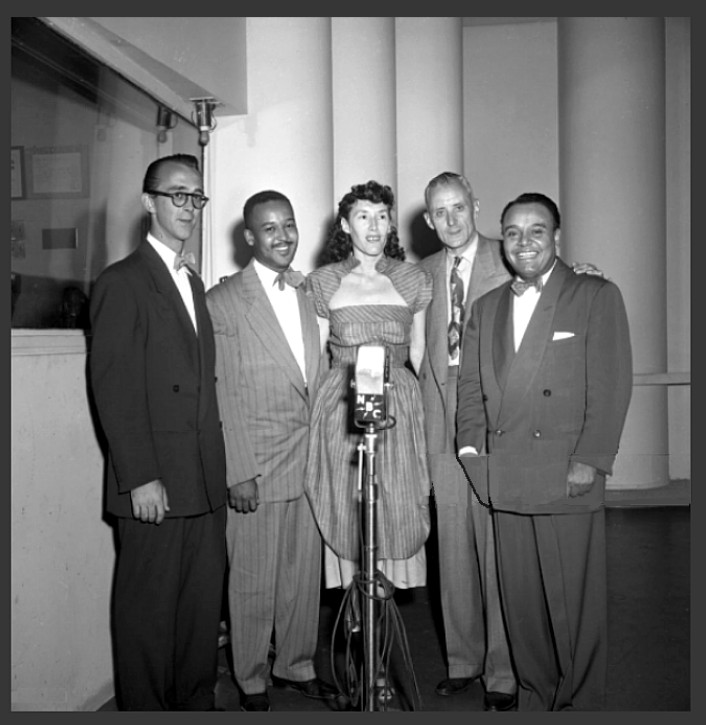
LISTEN (Windows Media Player):
1. "Bongo Boogie" - Lucky Millinder Orchestra (Vocal By Annisteen Allen) - King 4453-A - 1951.
2. "I'm Waiting Just For You" - Lucky Millinder Orchestra (Vocal By Annisteen Allen and John Carol) - King 4453-AA - 1951.
3. "My Baby Keeps Rollin'" - Annisteen Allen - King 4622 - 1953.
4. "Trying To Live Without You" - Annisteen Allen - King 4622 - 1953.ALL FOUR SONGS played in sequence.
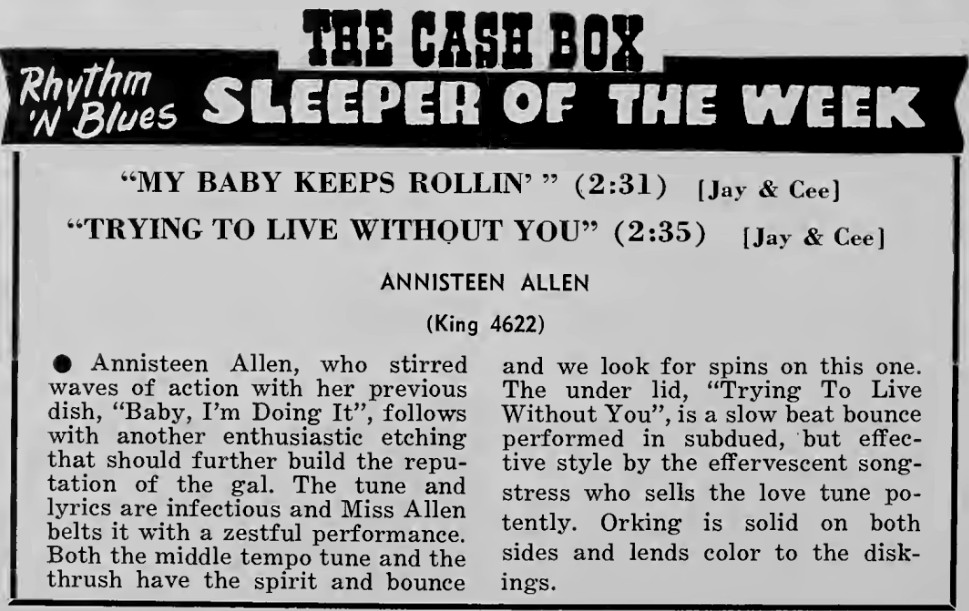
|
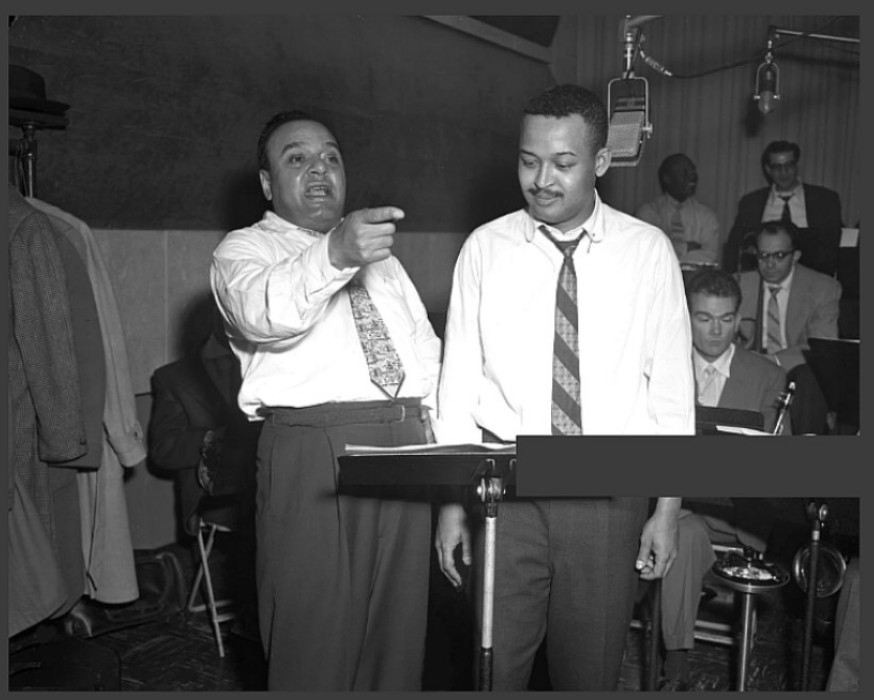
|
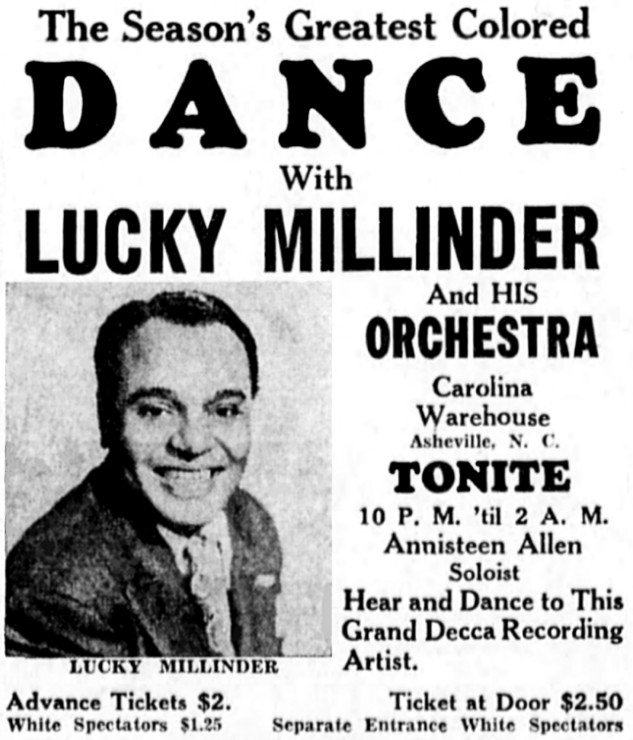
|
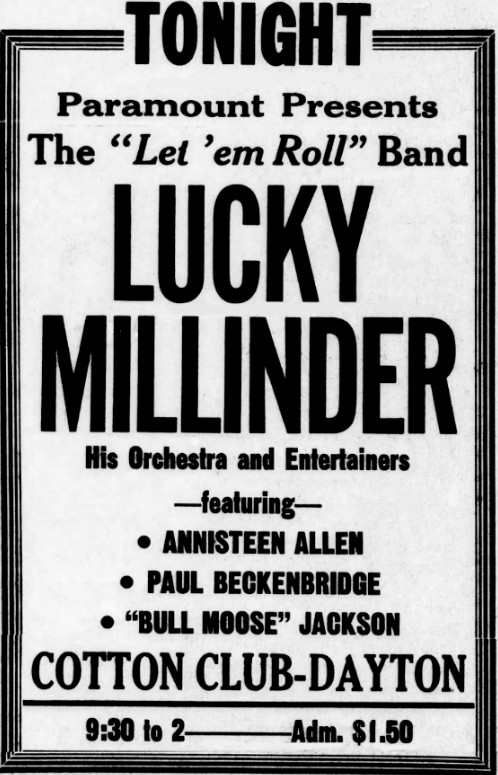
|
Above Left: ASHEVILLE CITIZEN TIMES, May 29, 1946. Above Right: OHIO DAILY EXPRESS, November 8, 1947.
NOTE: Typo, it should be "Paul Breckenridge". Paul recorded four records on the King label (1947-1948). Seven of the eight sides are spiritual songs.Thirty minutes more entertainment, two additional soloists, and fifty cents less for admission as compared to the Asheville appearance.
Above Left: Label image of King 4608, recorded on January 28, 1953 and released in 1953. "Baby I'm Doing It" is an answer-song for The "5" Royales' "Baby Don't Do It". It seems business as usual that the original composers get no credit. On the label, it looks like the answer was written by committee, but BMI.com credits only Henry Glover and Alan Freed.
The flip-side, "Yes I Know" is also an answer-song, to Willie Mabon's "I Don't Know", released in late 1952. There are eighty-four "Yes I Know" titles listed at BMI.com, but none credit "Jacques", who is credited on the label, as the composer.
Above Middle: Label image of Apollo 443, recorded on October 30, 1952 and released in December 1952. Composer Lowman Pauling was a member of The "5" Royales. In March 1953, Cash Box's "The Nation's R & B Top Ten" listed the original at #3 and the answer at #7.
Above Right: Label image of Chess 1531, released in November 1952. This record first came out on Parrot 1050 (the label's first release). It was subsequently sold to Chess, where it first showed up as Checker 1050 (a Chess subsidiary label), then quickly switched over to Chess 1531.
CASH BOX, February 21, 1953:
....Willie Mabon hit the jackpot with "I Donít Know" and while still one of the top sellers, for a time was number one in every r&b city in the nation. The tune was so tremendous, Mabon became an instantaneous sock draw in the biggest blues theatres. It was picked up and recorded in the pop and western fields, with Buddy Morrowís version selling very heavily.The tune was answered by Linda Hayes and Annisteen Allen via "Yes I Know". The latter, using the same tune and almost the same lyrics, also became an immediate hit and the charts carry both the original and the answer....
(NOTE: The Linda Hayes version of "Yes I Know" can be seen, heard, and learned about in the Parrot Records - Part Two article.)
CASH BOX, March 28, 1953:
The trend to a follow-up of a hit continues. The public has demonstrated its keen interest in "what comes next?" by laying the dollar on the line and buying in large quantities the continuation of a story from one disk to another. What has been most unusual is that the public doesnít seem to care what label and what artist does the follow up. (Well we should amend that to "as long as itís a good treatment").The current trend was started by Willie Mabonís "I Donít Know" which turned out to be a sensational slicing. Linda Hayes lost no time in coming up with the answer "Yes I Know," which also took solid hold on the market and racked up phenomenal sales. All in the same story vein and riding the success of the original Mabon plate.
Another disk that broke the charts wide open is "Baby, Donít Do It", the Apollo etching by The "5" Royales. After this disk was obviously a blazing success, King submitted its follow-up, "Baby, Iím Doiní It," by Amnisteen Allen.
The amazing truth is that not only do the second chapters do well, but they have been doing almost as well as the originals. A look at The Cash Box Nationís Rhythm and Blues Top Ten will show the two originals and the two answers therein....
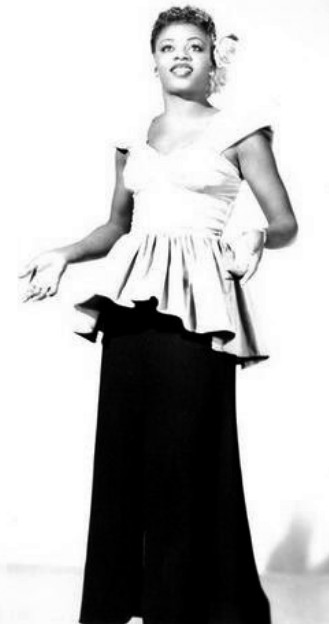
ANNISTEEN ALLEN
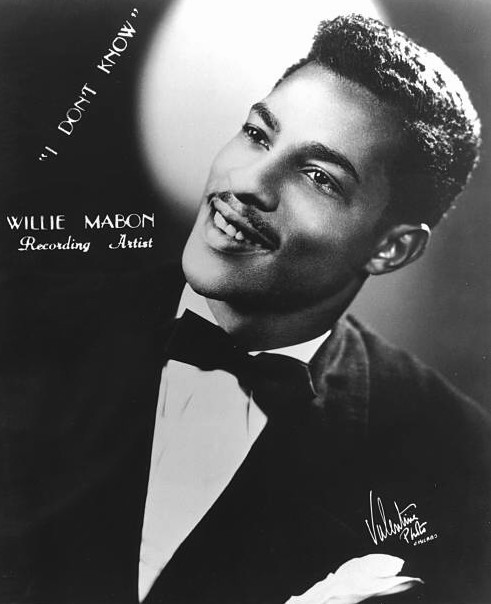
WILLIE MABON
At Direct Right: Photo of The "5" Royales. (Top) Lowman Pauling, (From Left) Obadiah Carter, Johnny Tanner, Clarence Pauling, and Jimmy Moore.
Disco-File shows the members for "Baby Don't Do It" as Obadiah Carter, Otto Jeffries, Jimmy Moore, Lowman Pauling, and Johnny Tanner.
LISTEN (Windows Media Player):
1. "Baby I'm Doin' It" - Annisteen Allen - King 4608 - 1953.
2. "Yes I Know" - Annisteen Allen - King 4608 - 1953.
3. "Baby Don't Do It" - The "5" Royales - Apollo 443 - 1952.
4. "I Don't Know" - Willie Mabon And His Combo - Chess 1531 - 1952.ALL FOUR SONGS played in sequence.
Cash Box Review (2/21/53):
ANNISTEEN ALLEN — King 4608
Baby I'm Doin' It (B) Annisteen Allen belts a moderate tempo cutie with her powerful voice. Reading is stimulating and commands attention.
Yes I Know (B) The answer to "I Donít Know" is given by Miss Allen and her treatment is spirited, humorous, and alive. The tune is a hot item and this one should share in the plays.(NOTE: A rating of B was considered as "very good".)
THE BILLBOARD, October 17, 1953:
BESS CHARGES KING PILFERS "BABY DON"T DO IT"
NEW YORK—Bess Music filed suit this week in Federal Court against King Records and its affiliated publishing firms, Jay-Cee and Lois Music.The action charges that the defendants infringed on the Bess Music tune, "Baby Don't Do It", which clicked heavily earlier this year via an Apollo waxing by the Five Royales.
The answer-type ditty, "Baby I'm Doing It", recorded on King by Annisteen Allen, and held in its publishing firms, is claimed to be a direct copy of "Baby Don't Do It". The latter was written by Lowman Pauling in 1952.
The suit asks for an injunction and damages plus impounding of alleged infringing master until the court action is resolved.
(NOTE: At this time, the Apollo label and Bess Music were owned by Bess Berman and her partners.)
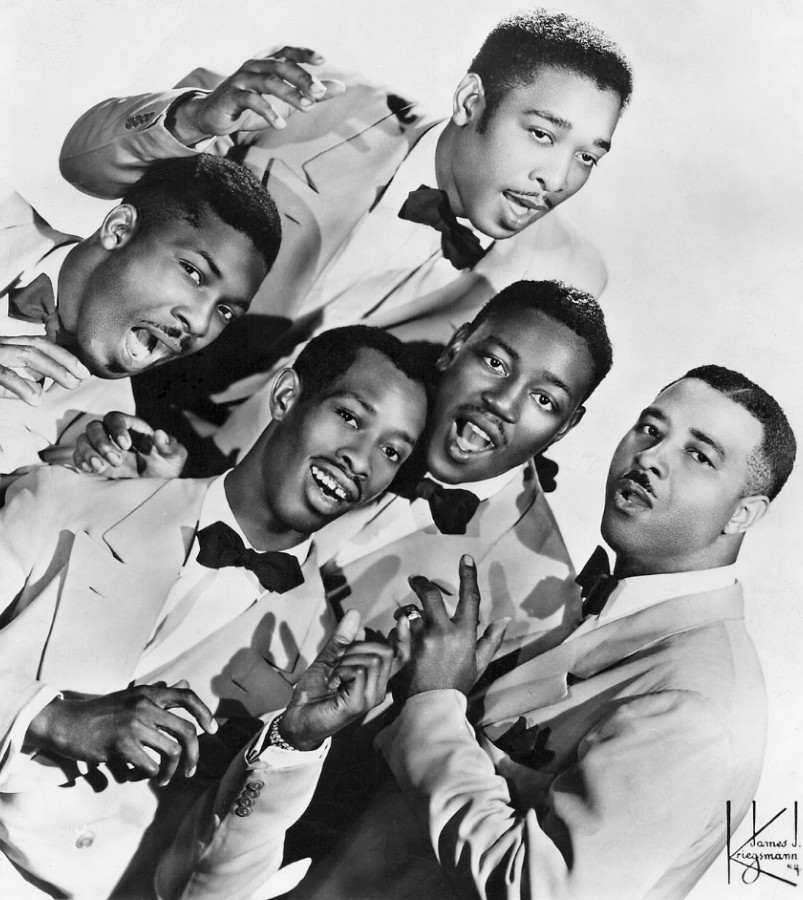
BILL JOHNSON AND HIS MUSICAL NOTES
FREE LANCE STAR, August 20, 1947:
Bill Johnson and his Musical Notes have gone so far in so short a time that they probably have a lot of other "cocktail units" wondering what the trick is. Organized only eighteen months ago, they've played some of the best jobs around the East and landed an RCA Victor recording contract.You've probably heard of several Bill Johnsons in the music business and wonder whether this is the same one who wrote "Tuxedo Junction". Well, you're right. William Luther Johnson is the young man who spent more than half his career in the Erskine Hawkins band, playing the famous alto solos on "Cherry", "Song of the Wanderer", and "Bear Mash Blues" and composing and arranging "Swinging on Lenox Avenue", "Uptown Shuffle", "Wedding Blues", "Dolomite", and others.
Born in 1913 [sic 1912] in Georgia [sic Georgia], Bill spent most of his youth in Florida. His father taught harmony and theory, but Bill got his education at Marquette University and the Conservatory of Wisconsin, studying harmony, arranging and piano; he'd picked up sax and clarinet at high school, too. To pay his way through college, he worked with George Abernathy's band.
After two years back home in Florida, he went to New York in 1935, worked with Baron Lee's Blue Rhythm Band and Tiny Bradshaw's band for a few months each, and was with Erskine Hawkins playing lead alto from 1936 until 1943. "Tuxedo Junction" started out as a sax riff which he and the tenor man, Julian Dash, contributed when an extra side was needed on a record date.
In 1943 and 1944 Bill wrote arrangements for Boyd Raeburn, Lucky Millinder, and Vincent Lopez. Then he toured the South Pacific as a member of Snub Mosely's band.
While on the tour he conceived the idea of forming a small unit in which every man could sing part-harmony as well as playing an instrument. Very few groups have done this successfully. Bill still has the same men he started out with: Egbert Victor, piano; Jimmy Robinson, bass; and Gus Gordon, drums and solo vocals.
Their RCA Victor records, such as "Don't You Think I Ought to Know" and "Pretty Eyed Baby" have been doing nicely. And Bill, who writes a lot of the tunes and all the arrangements, is doing very nicely himself.
Click HERE for an article about Bill Johnson & The Musical Notes by Marv Goldberg. (Will open in a separate window)
Above: Label image of Alert 202-B released in 1946. Vocalist Grace Smith followed with two releases on the National label in 1948. Velma Nelson, who is credited as composer on the label, had the original version of "If I Were A Itty Bitty Girl, Parts I &II," released on Aladdin in mid-1946.
The label gives the members of Bill Johnson's orchestra as Bill Johnson, Ray Turner, Gene Brooks, Clifton "Skeeter" Best, Jimmy Robinson, and Egbert Victor. When they became Bill Johnson And His Musical Notes, Turner and Brooks had left and Gus Gordon, Drums was added.
LISTEN (Windows Media Player):
"If I Was A Itty Bitty Girl, Part 1" - Grace Smith With Bill Johnson's Orchestra - Alert 202 - 1946.
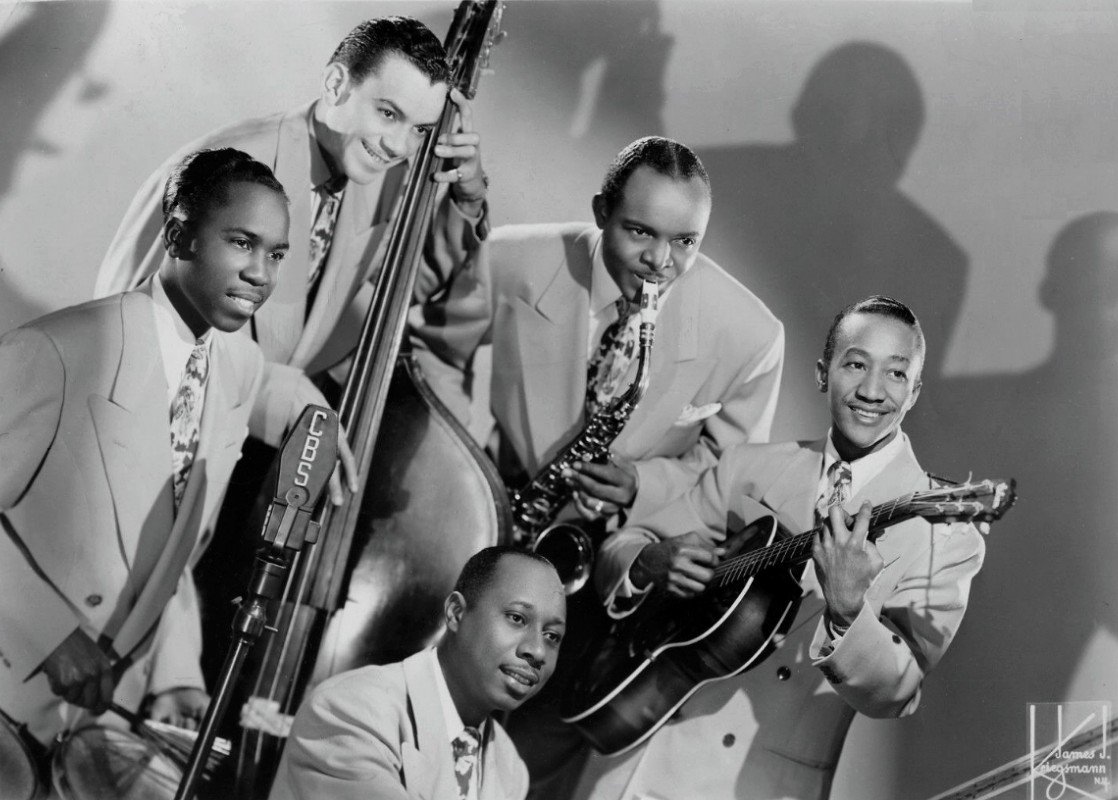
|
Above: Bill Johnson And His Musical Notes, (L-R) Gus Gordon, Jimmy Robinson, Egbert Victor (on piano at bottom), Bill Johnson, and Clifton "Skeeter" Best.
Above Left: Label image of Harlem 1011 A, released in 1947. This was first released on Harlem (matrix #IN 143). A different recording of this same song was then released on RCA Victor 20-2225 in the same month. Gus Gordon is the lead singer on both versions. Above Middle: Label image of King 4171-A. The song was released on Queen 4171-A and King 4171-A in 1947. It's the same version that was used on the Harlem record (note the matrix #IN 143). Neither the song titles or "Wettergren" are listed at BMI or ASCAP.
This is the first of three releases they had on King Records (1947-1949). The flip-side is "Tab's Purple Heart", an instrumental by Tab "Tubby" Smith And His Orchestra.
Above Right: Label image of RCA Victor 20-2225-A, released in March 1947.
LISTEN (Windows Media Player):
1. "Don't You Think I Ought To Know" - Bill Johnson And His Musical Notes - King 4171-A - 1947.
2. "Don't You Think I Oughta Know" - Bill Johnson And His Musical Notes - RCA Victor 20-2225 - 1947.BOTH SONGS played in sequence.
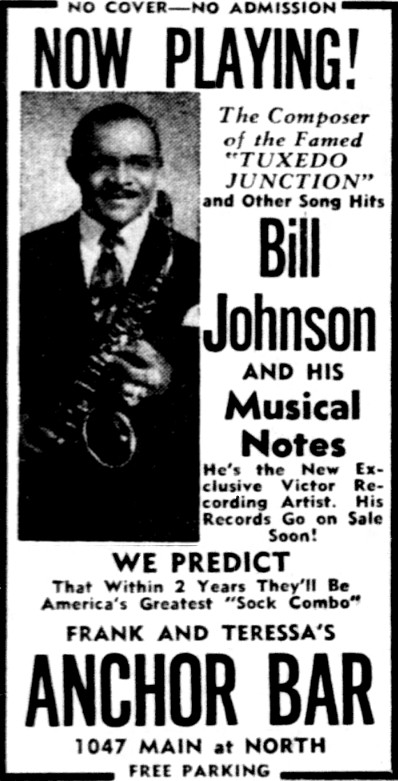
|
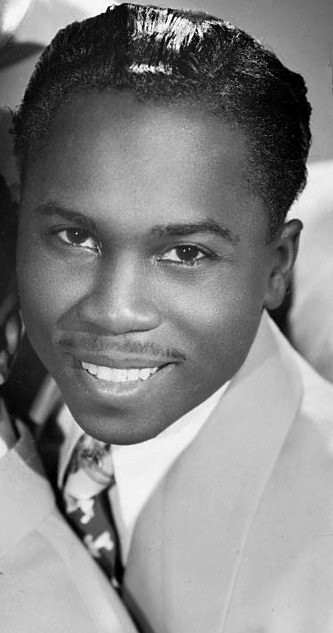
LEAD SINGER |
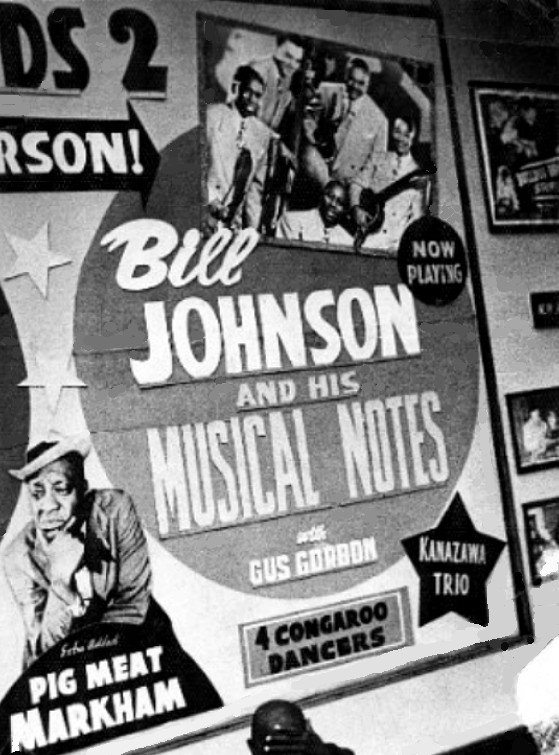
|
Above Left: BUFFALO EVENING NEWS, March 26, 1947.
NOTE: Their first record for RCA Victor was released on March 31, 1947.Above Right: Photo, taken by Gus Gordon, of a poster for an event starring Bill Johnson And His Musical Notes.
Above Left: Label image for King 4286-A, released in March 1949. "How Would You Know" is the same song that The Robins released on RCA Victor in 1953. The Robins' tenor, Billy Richard, takes credit as composer on the label and sings lead on the song. BMI.com credits Henry Glover and Lucky Millinder as co-composers of "How Would You Know" and Bill Johnson as composer of the flip-side, "Roselle". Above Middle: Bill Johnson playing the saxophone.
Above Right: Label image for King 4338-AA, released in December 1949. BMI.com confirms Bill Johnson as composer. As shown on the flip-side label, Clifton Best and William Joseph are the composers of "What Can I Do".
LISTEN (Windows Media Player):
1. "How Would You Know" - Bill Johnson And His Musical Notes - King 4286-A - 1949.
2. "Roselle" - Bill Johnson And His Musical Notes - King 4286-AA - 1949.
3. "I Love You More Each Day" - Bill Johnson And His Musical Notes - King 4338-AA - 1949.
4. "What Can I Do" - Bill Johnson And His Musical Notes - King 4338-A - 1949.ALL FOUR SONGS played in sequence.
THE JUBALAIRES
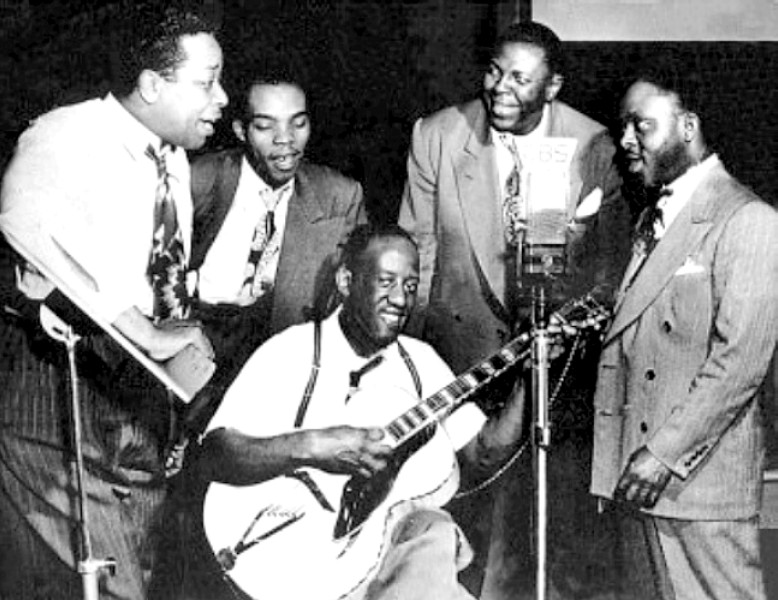
|
Above: Circa 1949 photo of The Jubalaires, (L-R Standing) J.C. Ginyard, Ted Brooks, George McFadden, John Jennings, and, in front with the guitar, Bill Johnson.
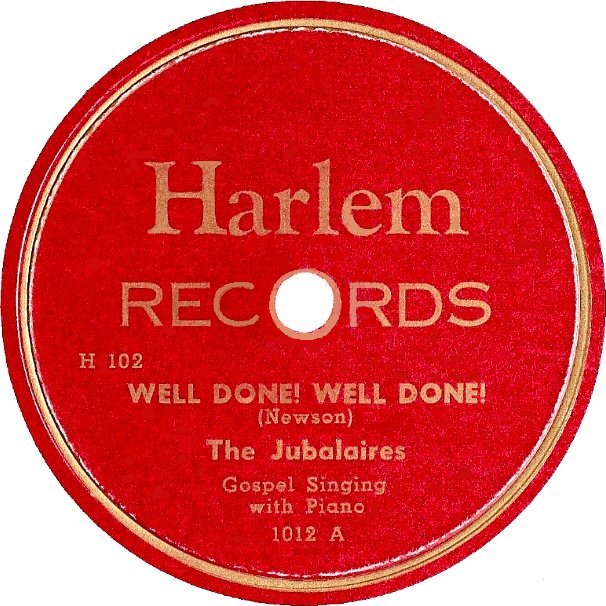
|
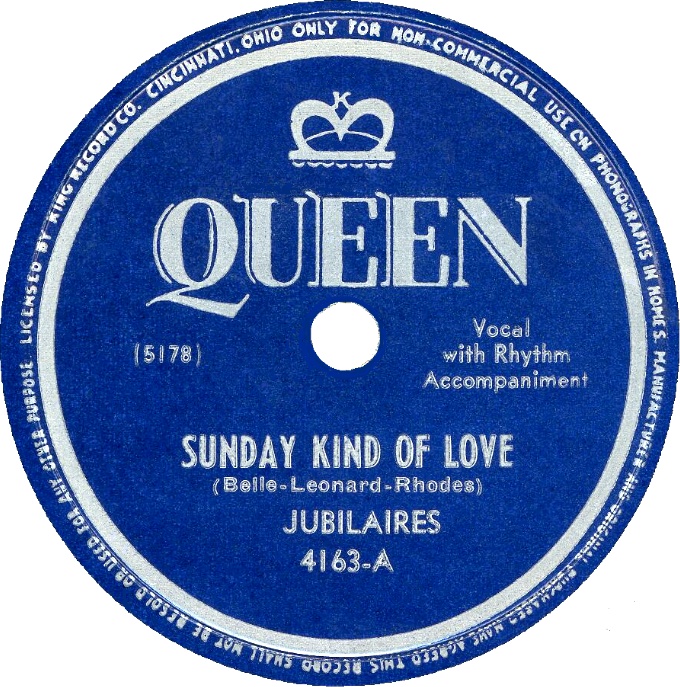
|
Above Left: Label image of Harlem 1012 A, recorded in January 1947 and released soon after. Harlem was one of Mayo Williams' labels, located in Chicago. This is the same song as "He'll Understand And Say Well Done" by The Four Knights, aka the Southland Jubilee Singers, on Decca 48018 A, released in January 1947. This record was re-issued in 1947 as by The Dixieaires, also on Harlem 1012. J.C. Ginyard left The Jubalaires in 1947 and formed a new group, The Dixieaires.
Above Right: Label image for Queen 4163-A, released in March 1947. This is the only record listed in Disco-File with their name shown as "The Jubilaires". This is The Jubalaires' first of five records on the Queen label, all released in 1947. They also had five records, one a Queen reissue, on the King label (1947-1950).
LISTEN:
1. "Well Done! Well Done!" - The Jubalaires - Harlem 1012 A - 1947.
2. "Gabriel Sound Your Trumpet" - The Jubalaires - Harlem 1012 B - 1947.
3. "Sunday Kind Of Love" - The Jubilaires - Queen 4163-A - 1947.
4. "Pray" - The Jubilaires - Queen 4163-B - 1947.ALL FOUR SIDES played in sequence.
Above Left: ST. LOUIS ARGUS, March 21, 1947. Above Right: Photo of The Jubalaires that was used in the clipping at left.
(L to R) Orville Brooks, Ted Brooks, Caleb Ginyard, and George McFadden.
"I'VE WAITED ALL MY LIFE FOR YOU"
The first version of this song was by The Jubalaires on Queen 4166-B, recorded in February 1947 and released in May 1947.
Orville Brooks (along with Ted Brooks, George McFadden, John Jennings, and Bill Johnson-guitarist) released "I've Waited All My Life For You" on Coral 65000 in 1948.
King (Queen's parent label) released a bass lead version of "I've Waited All My Life For You" by The Jubalaires on King 4325-A, recorded in March 1949 and released in November 1949.
Crown Records released "Waiting All My Life For You" by The Original Jubalaires in March 1954.
"I've Waited All My Life For You" was composed by Ted Brooks (BMI confirmed), who was a member of The Jubalaires.
However, BMI credits The Original Jubalaires' version ("Waiting All My Life For You") to Orville Brooks and Joe Bihari (vice president of Modern Records). Orville was Ted's brother. The Bihari brothers would sometimes slightly change the title of a song to obtain BMI credit.
It's unknown to me why Bissell Palmer is shown as a co-composer on both the Crown and Coral labels. Palmer was a lyricist who had some hit songs in the early-to-mid 1940s, but what is the connection here?
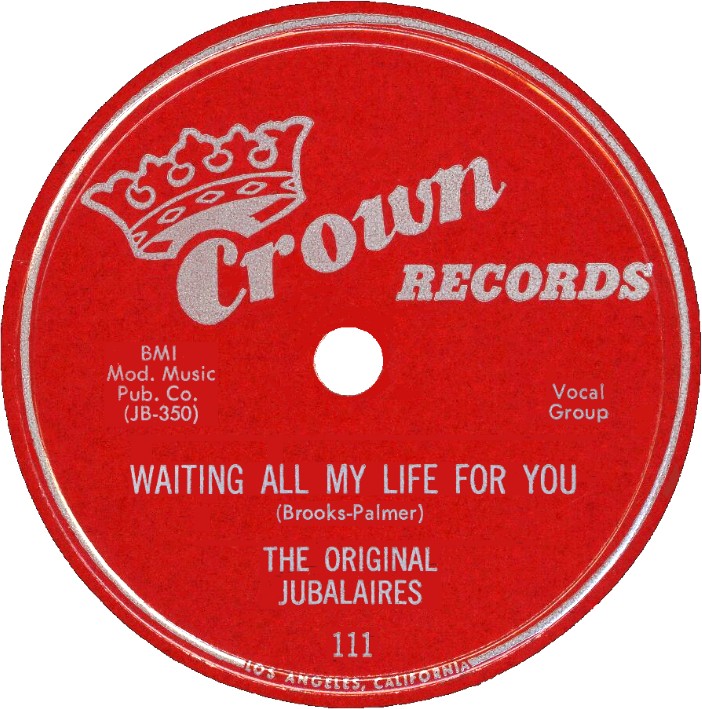
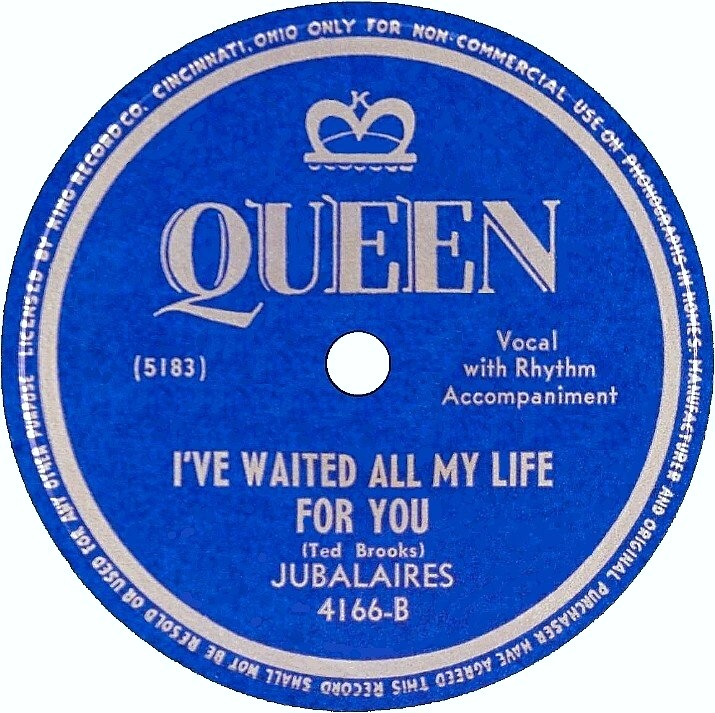
|
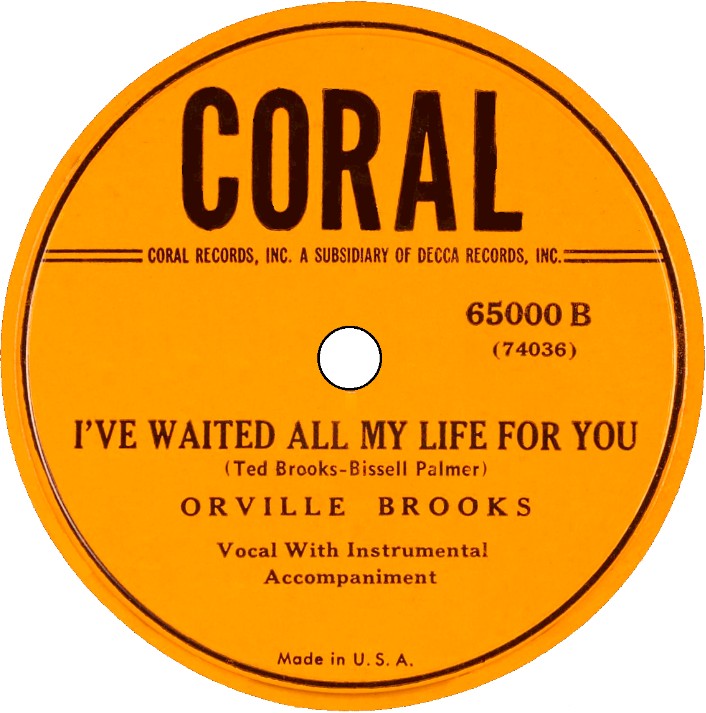
|
Above Left: Label image for Queen 4166-B, recorded in February 1947 and released in May 1947. Above Right: Label image for Coral 65000 B, recorded in August 1947 and released in October 1948.
This would seem to be the first record in Coral's 65000 Rhythm and Blues Series. It's interesting that Coral (or someone) decided to credit the artist as "Orville Brooks" with no mention of a vocal group backing. This record is actually sung by The Jubalaires.
LISTEN (Windows Media Player):
1. "I've Waited All My Life For You" - The Jubalaires - Queen 4166-B - 1947.
2. "I've Waited All My Life For You" - Orville Brooks (And The Jubalaires) - Coral 65000 B - 1948.
3. "I've Waited All My Life For You" - The Jubalaires - King 4325-A - 1949.
4. "Waiting All My Life For You" - The Original Jubalaires - Crown 111 - 1954.ALL FOUR SONGS played in sequence.
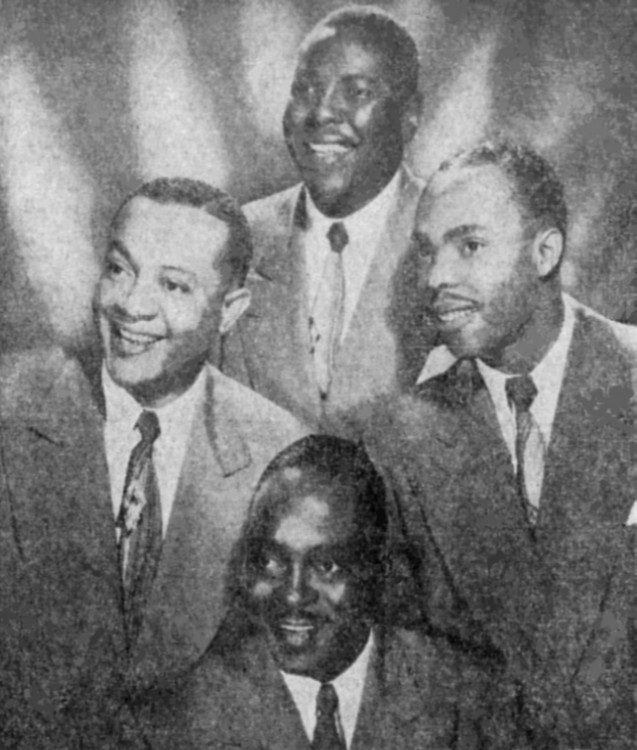
|
Above: MACON TELEGRAPH, August 9, 1949:
THE JUBALAIRES, the nation's greatest vocal group, singing stars of the Amos And Andy radio program, who has been borrowed by Rochester, who has injected their infectious rhythm into his all-star Hollywood Variety Revue, will be seen on stage here, Saturday, August 13, at 8 p.m., as a special feature of Rochester's program.NOTES:
1. Todd Baptista identifies the members in this picture as (Top) George McFadden, (Middle L-R) Bill Johnson, Ted Brooks, and (Bottom) John Jennings.
2. "Rochester", of course, is Eddie Anderson, who starred on the Jack Benny Show, using that name.OTTAWA CITIZEN, October 20, 1947:
The Jubalaires were pacted for the entire season on the Amos n' Andy show. They'll also remain on the Henry Morgan show as long as he is in Hollywood....
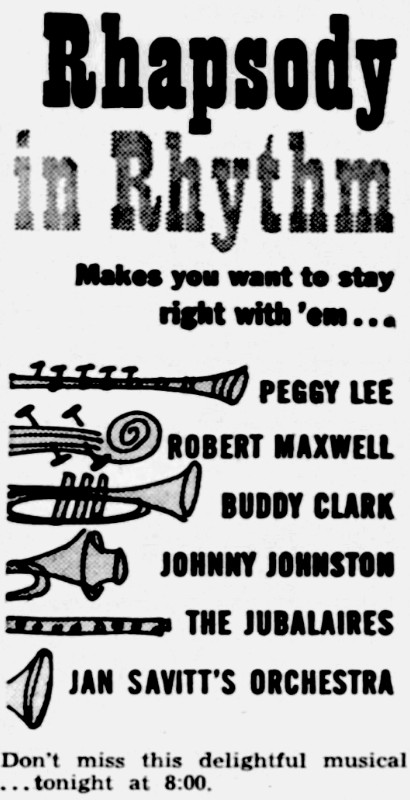
|
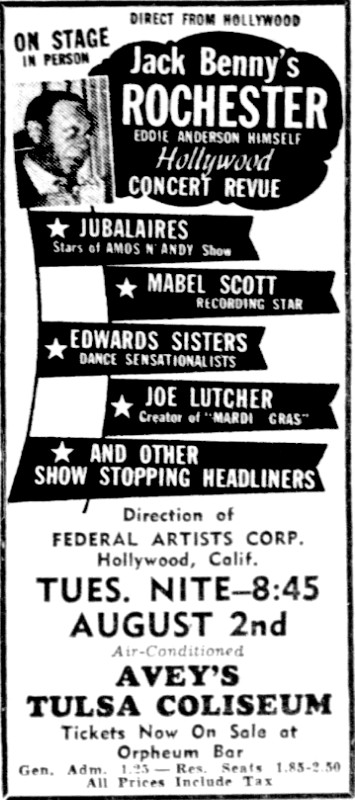
|
Above Left: DURHAM SUN, June 11, 1947.
NOTE: "Rhapsody In Rhythm" was a weekly CBS radio program that had its first show on June 11, 1947. Johnny Johnston and Buddy Clark alternated as the male singing star. The Jubalaires were regulars on the show.Above Right: TULSA DAILY WORLD, July 26, 1949.
NOTE: The Jubalaires have top billing.
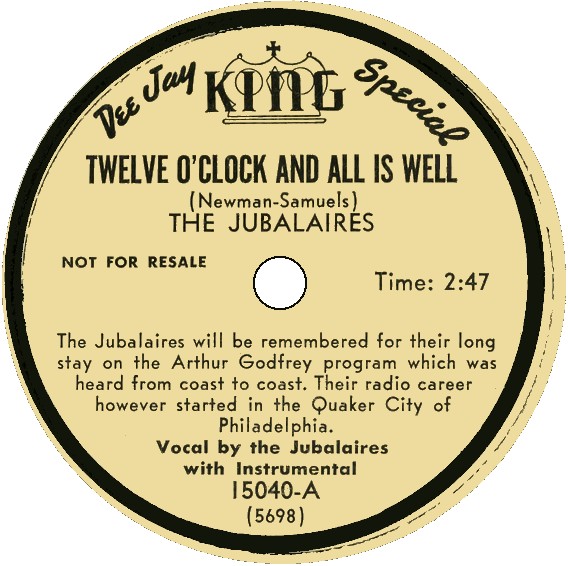
|
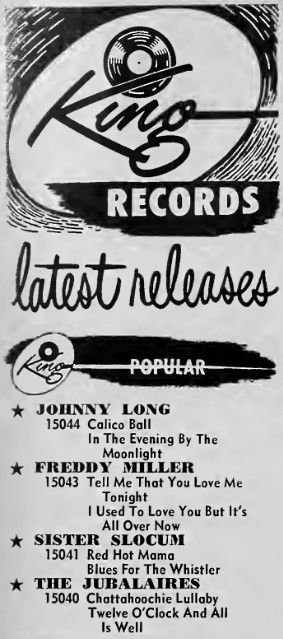
|
Above Left: Label image of King 15040-A, released in April 1950. The BIO on the B-side: Fifteen years ago the Jubalaires could be heard as the "Singing Waiters" in a Jacksonville, Florida, hotel and since that time they have run the gamut of theaters, churches, recordings, concerts, and television.
Above Right: CASH BOX, April 22, 1950.
NOTE: There is a section in this ad for "SEPIA", but The Jubalaires were put in the "POPULAR" group.CASH BOX, February 6, 1949: KING RECORDS BOW INTO POP PLATTER FIELD
CINCINNATI—King Records, Inc., this city, this week announced their entry into the pop disk field. Sydney Nathan, King prexy, stated that Dewey Bergman had been named musical director for the brand new King pop catalog. Henry Glover takes over the firmís race line.Bergman was formerly on CBS music staff and helped arrange some of that networkís top shows, including Lucky Strike Hit Parade. Has also been acting as arranger for the Guy Lombardo ork for the past ten years, is a member of ASCAP and has several motion pic scores to his credit.
Henry Glover developed and also arranged the Bull Moose Jackson combo. Bull Moose won The Cash Box race disk award for 1948 with his disking of "I Love You, Yes I Do". Other Bull Moose hits were, "All My Love Belongs To You" and "I Canít Go On With You." Glover was co-writer of the above three clicks.
Several artists have also been signed by King, Sydney Nathan stated. Among these are: Mary Lou Williams, vocalist-pianist; Bill Johnson, formerly of RCA-Victor; Paul Howard, previously of Columbia and a western band favorite; Red Stewart, who sang with Pee Wee King on the RCA-Victor label.
George Hudson is also a newcomer to the King roster. Glover, regarding Hudson, said: "I predict that Hudsonís sixteen piece unit will be considered one of the finest bands in new, modern jazz."
Nathan and Glover spent part of this past week in New York, from where they left for the west coast to cut twelve sides by the Jubalaries, vocal group featured on the Amos & Andy airshow.
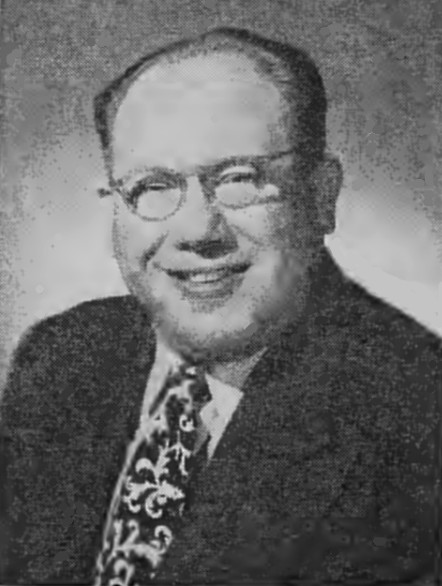
SYDNEY NATHAN — CASH BOX 2/6/49 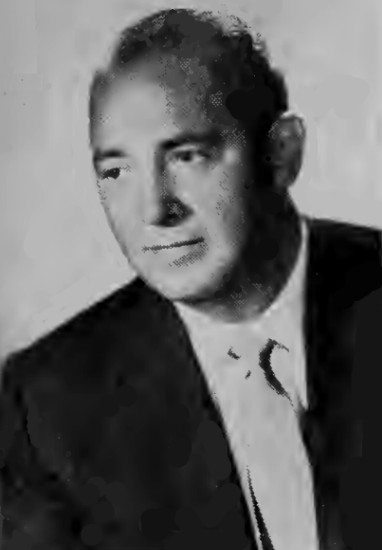
DEWEY BERGMAN — CASH BOX 3/22/52
LISTEN (Windows Media Player):
1. "Twelve O'Clock And All Is Well" - The Jubalaires - King 15040-A - 1950.
2. "Chattahoochie Lullaby" - The Jubalaires - King 15040-AA - 1950.BOTH SONGS played in sequence.
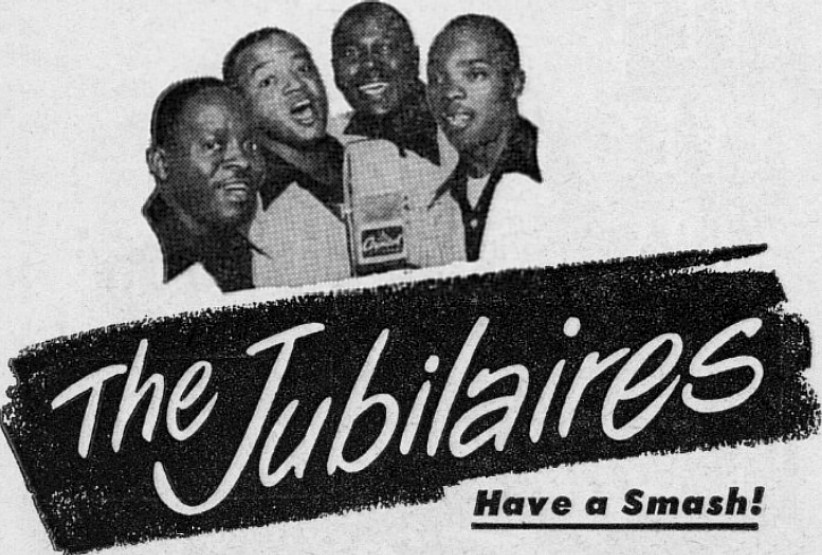
|
Above: CASH BOX, March 4, 1950.
NOTE: This clipping is from a Capitol Records advertisement. Note the "Capitol" on the microphone.
The Jubalaires' first record on Capitol was released in July 1949. Two of their releases on King overlapped with Capitol releases. Their name here is misspelled, which was a more common occurrence in the earlier days of the group.
EARL BOSTIC AND HIS ORCHESTRA
Earl Bostic, from Tulsa, OK, was an alto saxophone player, orchestra leader, composer, and arranger. He and his orchestra had records released on Majestic (1946), Gotham (1946-1950), King (1947-1960), and Vogue (1952-1954).
At Right: Autographed photo of Earl Bostic.
NEW YORK AGE, October 27, 1951: APOLLO HEADLINES BOSTIC
EARL BOSTIC has brought to New York perhaps the musical find of the year. Take the small group, for instance. It would perhaps be accurate to call this a "Big band within a small band", for here you'll see the unusual: eleven instruments played by only six men. Everyone in that incredible small combination plays at least two instruments, some play three.Earl, leading the parade, plays, in addition to his fine alto sax, the guitar, which he has thoroughly mastered.
Looking for new musical sounds? Then don't miss this great outfit!
PITTSBURGH COURIER, February 1955: BOSTIC'S DISCS HELP HIM CLICK
DETROIT—Earl Bostic holds a degree in English from Xavier University, but it doesn't come near the torrid degrees of Fahrenheit he makes with his alto sax.Prior to forming his own band in 1946, Bostic had been a featured saxophonist with Cab Calloway, Don Redman, and Lionel Hampton.
In ten years Bostic has made 100 recordings. These etchings have realized consistent sales through the Bostic formula of success.
No. 1—Most of his records have been standards, more so than new tunes.
No. 2—He plays the harmony like it was written and at no time gets far enough away from the melody that it isn't recognizable.A product of Tulsa, Oklahoma, he is the son of a guitarist father and a piano playing mother who wanted him to be a teacher....
Bostic does all of his arranging. He declared his only chagrin now is the difficulty in raising a big band. His current outfit is a seven-piece outfit....
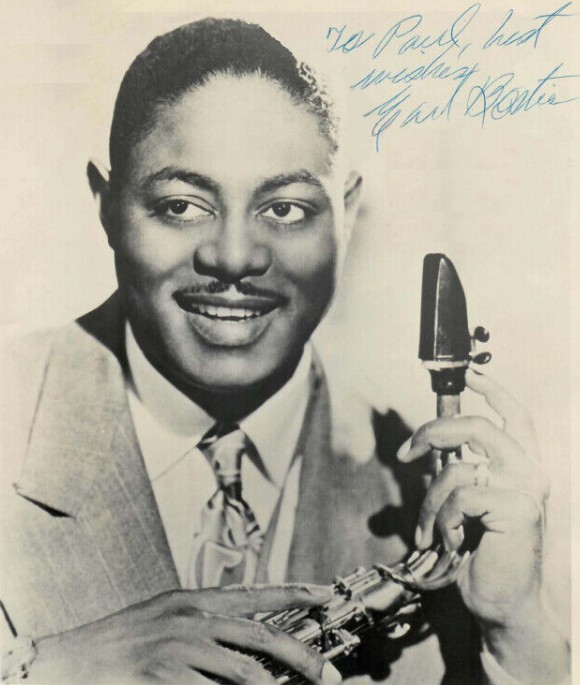
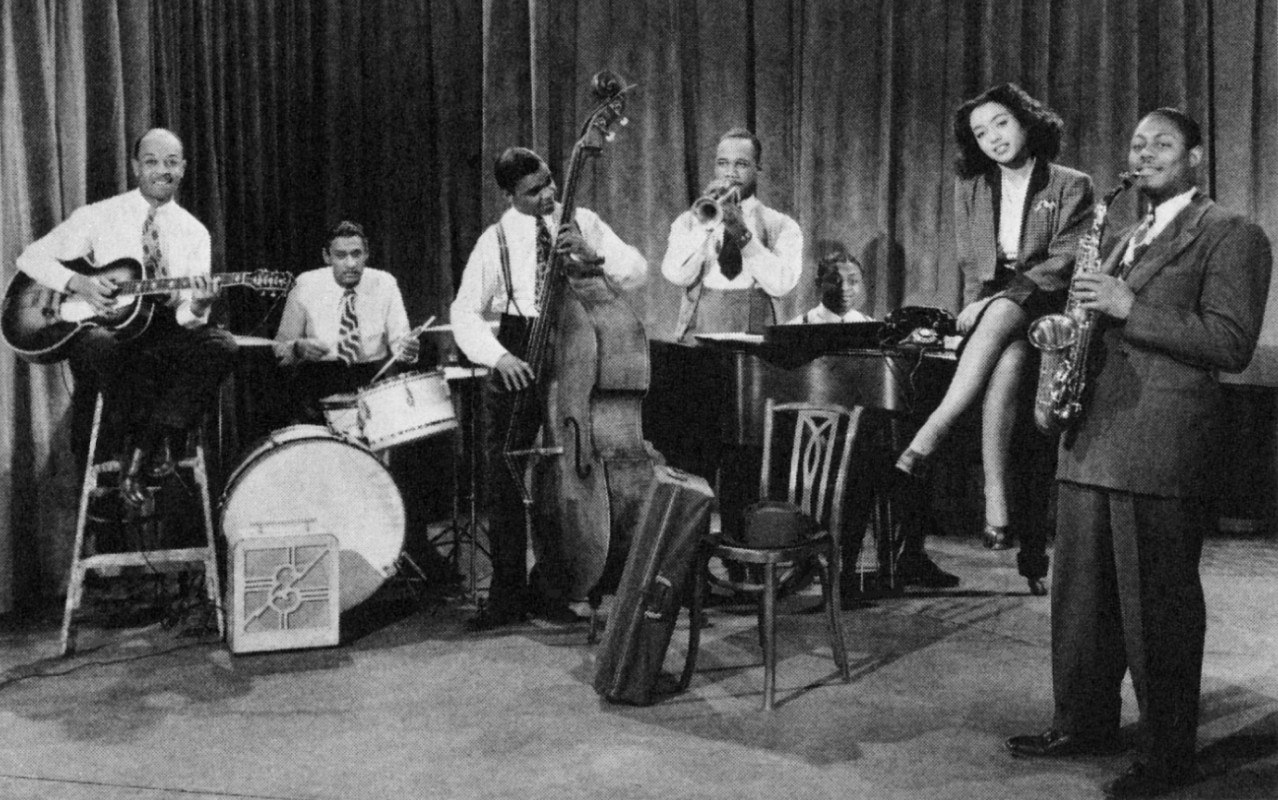
|
Above: Photo of The Earl Bostic Band from the 1947 short "I Ain't Gonna Open That Door", an answer to "Open The Door, Richard". (L-R) Danny Barker, George Jenkins, Huck King, Roger Jones, Ted Barnett, Joya Sherrill (ex-Duke Ellington singer), and Earl Bostic.
At Direct Right: KING RE-INKS BOSTIC (Circa 1957)
CINCINNATI—King Records has re-signed vet alto saxophonist Earl Bostic to an exclusive recording contract. Bostic has never cut for any other label except King and DeLuxe [sic], the latter firm being owned by King. Bostic has now been on the King label for over ten years and has seventeen albums on the market. In the pic, Bostic (right) is shown with King prexy Syd Nathan.THE BILLBOARD, August 23, 1947: KING CONSOLODATES KING, QUEEN LABELS
CINCINNATI—King Record Distributing Company here this week announced consolidation of its two labels, King and Queen, with President Sydney Nathan revealing that the King blue label will supplant the former Queen line, which consisted of spirituals, kiddie and novelty sets, and polkas.Firm's [King] maroon label will continue to be devoted exclusively to hillbilly disks.
First in under the blue label will be Earl Bostic, Negro saxist, who has been pacted to cut Parts 1 and 2 of "That's the Groovy Thing".
Subsequent issues [by Earl Bostic] will include "Cuttin' Out" backed by "Here Goes", skedded for a September 1 release, and "My Special Dream" with "I'm the Guy That Loves Ya" on the flip-over, for release September 11.
(NOTE: They neglected to mention that the Queen line also consisted of rhythm and blues. Also, it's somewhat deceiving to say "pacted to cut", as the two "That's A Groovy Thing" sides were purchased from Gotham Records.)
The Cash Box Pic O' The Week (5/13/46):
EARL BOSTIC AND HIS ORCHESTRA — GOTHAM 104....
"That's The Groovy Thing"
Here's a disk that's a powerhouse of rhythm. "That's The Groovy Thing" is as groovy as its title. It's a jump number the like of which comes by only once in a long while.Tho specially patterned for the jump location, the fact that it's first quality jazz, too, should give it more than passing attention in any spot where liberal music tastes are found.
The melody is built around a bare handful of notes, but what happens to that handful when the Bostic crew goes at it with instrumental and vocal tears down the house with rockin'. Get out and hear this tune first chance you get. It's a natural....
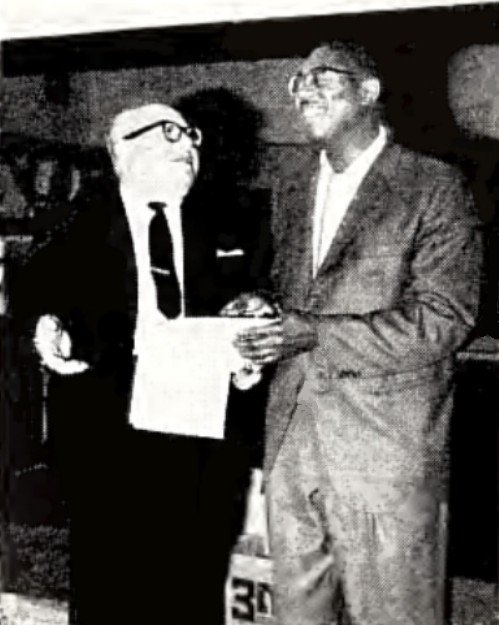
SYDNEY NATHAN AND EARL BOSTIC
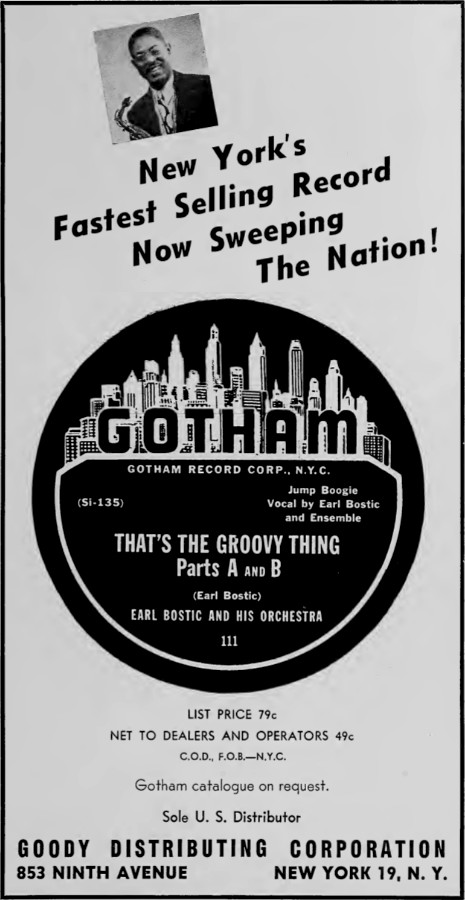
|
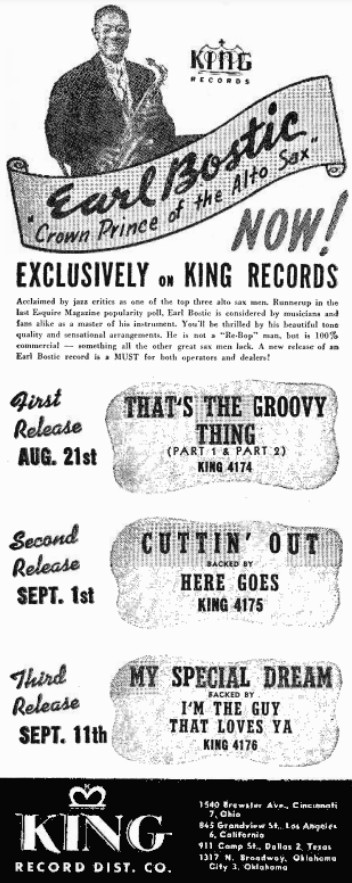
|
Above Left: CASH BOX, July 15, 1946.
NOTE: The pictures of Earl Bostic on both clippings are from the same photo.Above Right: THE BILLBOARD, August 23, 1947.
NOTE: The three Earl Bostic records were given consecutive numbers.
All six sides were also released on the Gotham label. It seems that they were all purchased from Gotham Records.
King 4174, "This Is The Groovy Thing - Parts 1 & 2", was also released on Queen 4174.
Above Left: Label image of Gotham 104 A (matrix Si-135) was recorded in March 1946 and released in 1946. Above Middle: Label image for Gotham 111 A was released in 1946. Part A is a re-issue of Gotham 104 A (matrix Si-135). Part B was recorded in July 1946 (matrix Si-153) and added for the Gotham 111 record.
A vocal group version of this song was released on 20th Century TC-5037 by The Gems in October 1955. 20th Century was a subsidiary label of Gotham.
Above Right: Label image for King 4174-A, released in 1947. This is the same side as Gotham 111 A, Si-135 is etched in the dead wax. The flip seems to be the same side as Gotham 111 B, but nothing is etched in the dead wax.
The "Part 2" label gives a more comprehensive listing of the orchestra members: Earl Bostic, alto sax; Tony Scott, clarinet; John Hardee, tenor sax; Leamon Boler, trumpet; Jimmy Shirley, guitar; Ed Nicholson, drums; Jimmie Jones, bass; George Parker, piano.
At Direct Right: CASH BOX, April 26, 1952. (Earl Bostic Orchestra)
LISTEN:
1. "That's The Groovy Thing (Part 1)" - Earl Bostic Orchestra - King 4174-A - 1947.
2. "That's The Groovy Thing (Part 2)" - Earl Bostic Orchestra - King 4174-B - 1947.BOTH SIDES played in sequence.
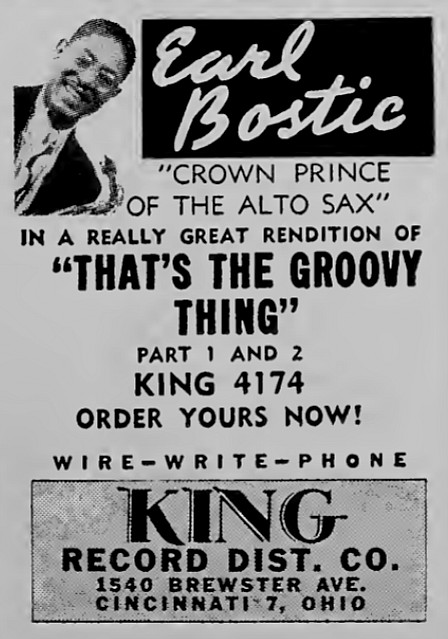
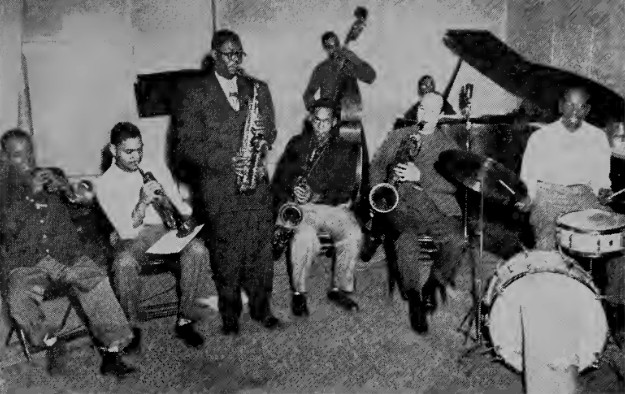
EARL BOSTIC ORCHESTRA — CASH BOX DATED 4/26/52
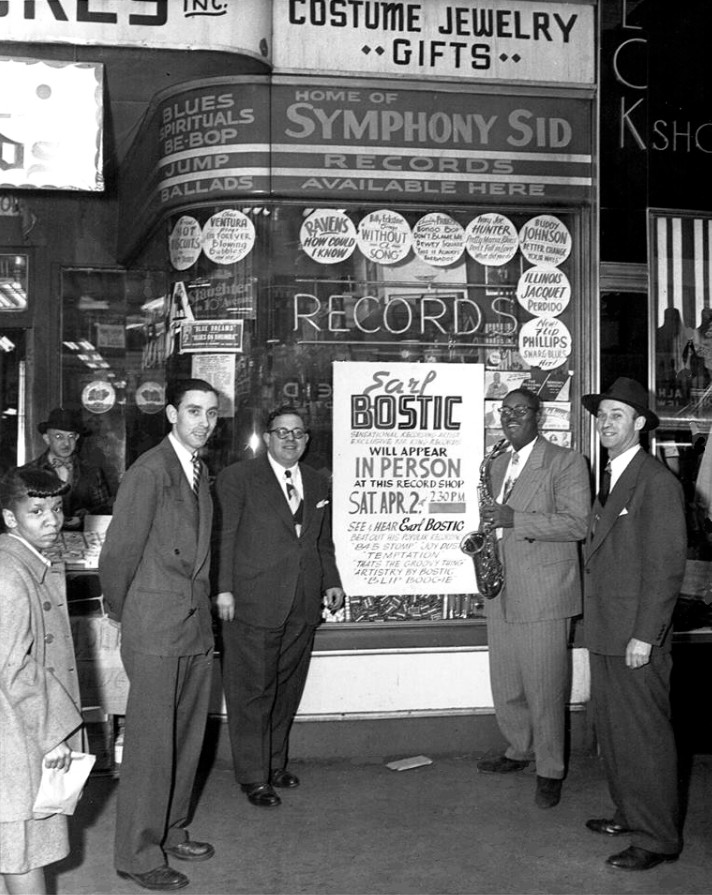
Above Left: Earl Bostic at Symphony Sid In New York City on April 2, 1949. Third up from the bottom in the list of songs on the poster is "That's The Groovy Thing". Maybe pick up a copy of The Ravens' "How Could I Know" while you're there?
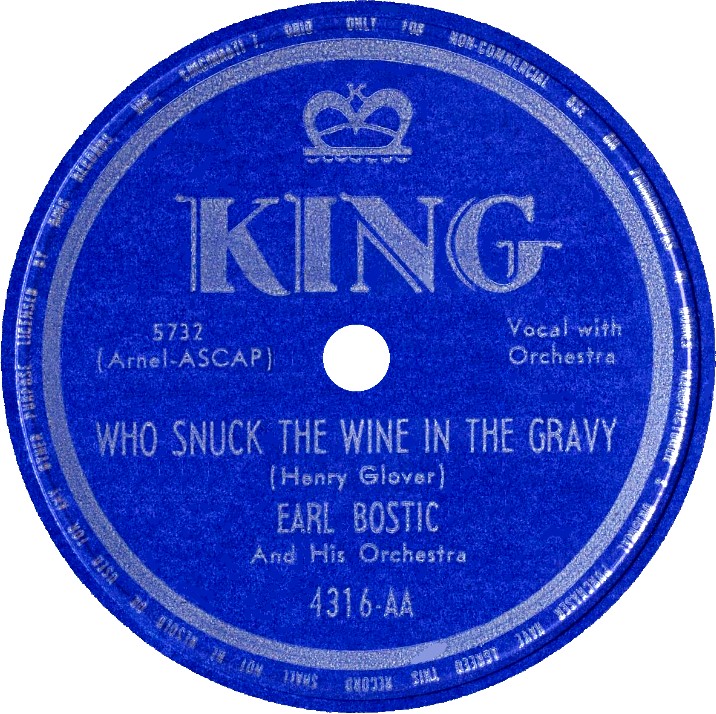
|
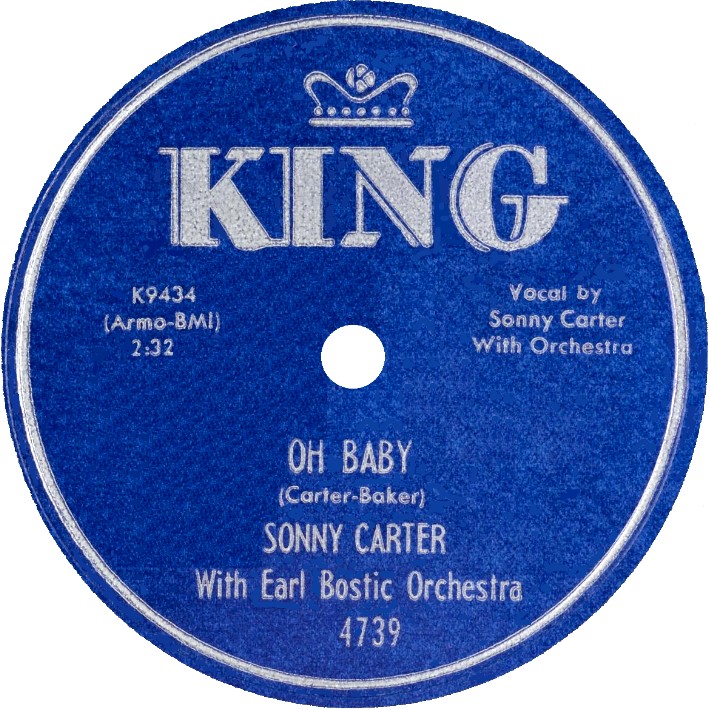
|
Above Left: Label image for King 4316-AA, released in December 1949. Above Right: Label image for King 4739, released in 1954. Sonny Carter has an uncredited vocal group backing him. The flip-side, "There Is No Greater Love", is by Sonny Carter, but without a vocal group backing him.
At Direct Right: Photo of Earl Bostic.
At Far Right: Picture of Sonny Carter from the Detroit Tribune dated April 10, 1954.
NOTE: Per newspaper accounts, Sonny was a rhythm and blues/popular singer from Detroit. He also performed as a Master of Ceremonies.Cash Box Review (10/15/49):
EARL BOSTIC ORCHESTRA
"Who Snuck The Wine In The Gravy"/"Platter Popa" King 4316
Pair of hot tunes for music ops to listen to are these fresh sides by maestro Earl Bostic. Wax, titled "Who Snuck The Wine In The Gravy" and "Platter Poppa", makes for mellow listening pleasure and should be greeted warmly.Top deck rolls in up tempo fashion with a set of cute lyrics. The flip is a fast driving instrumental that should do well in those jump locations. Top deck gets our nod.
The Billboard Review (10/15/49):
EARL BOSTIC ORCHESTRA — King 4316
Who Snuck The Wine In The Gravy (72) Jivey, Louis Jordan-type novelty material isn't fully exploited here.(NOTE: Ratings had a range of 0-100 with 70-79 considered as "good".)
CASH BOX, March 27, 1954: BOSTIC SIGNS CROONER
Earl Bostic, and his Orchestra, now touring the West, recently added a male vocalist, Sonny Carter, to handle the "swoon" department with the aggregation. Carter, is a native of Detroit, Michigan; but is well known to many night club goers throughout the country. Bostic, is so enthused with the new lad, he will record him when the band reaches California, the latter part of March....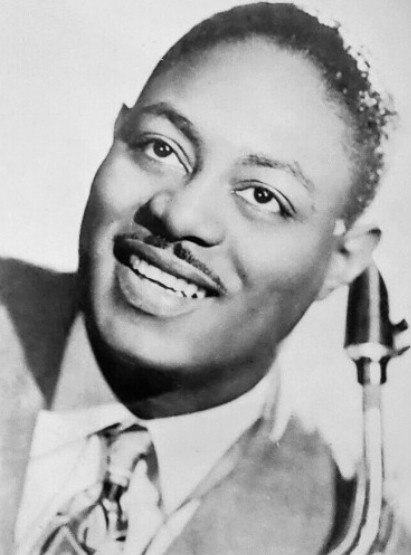
EARL BOSTIC 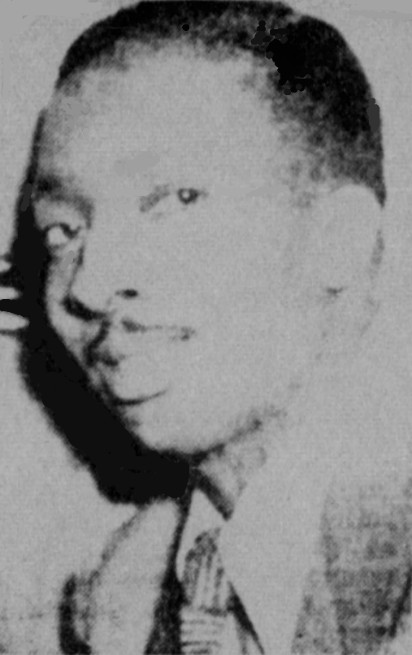
SONNY CARTER
The Billboard Review (10/2/54): SONNY CARTER — King 4739
Oh Baby (77) Sonny Carter, backed by the Earl Bostic ork turns in a good reading of a pop-styled r.&b. tune. The ork work, as is to be expected, is first-rate. The beat makes this a good item for the boxes.(NOTE: Ratings had a range of 0-100 with 70-79 considered as "good".)
LISTEN (Windows Media Player):
1. "Who Snuck The Wine In The Gravy" - Earl Bostic Orchestra - King 4316-AA - 1949.
2. "Oh Baby" - Sonny Carter (And Vocal Group), Earl Bostic Orchestra - King 4739 - 1954.BOTH SONGS played in sequence.
Cash Box Review (10/9/54):
SONNY CARTER — King 4739
Oh Baby (B) Carter sings a middle tempo bouncer with romantic lyrics and a light hearted approach. Good listening with a dance tempo.(NOTE: A rating of B was considered as "very good". Both sides of this record received a "B" rating.)
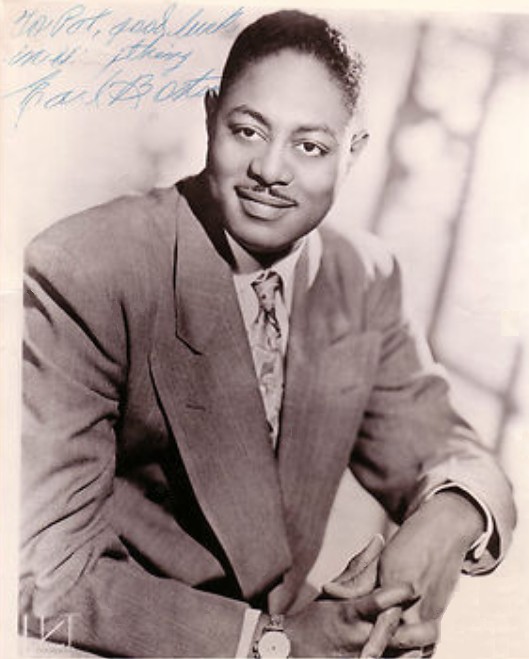
|
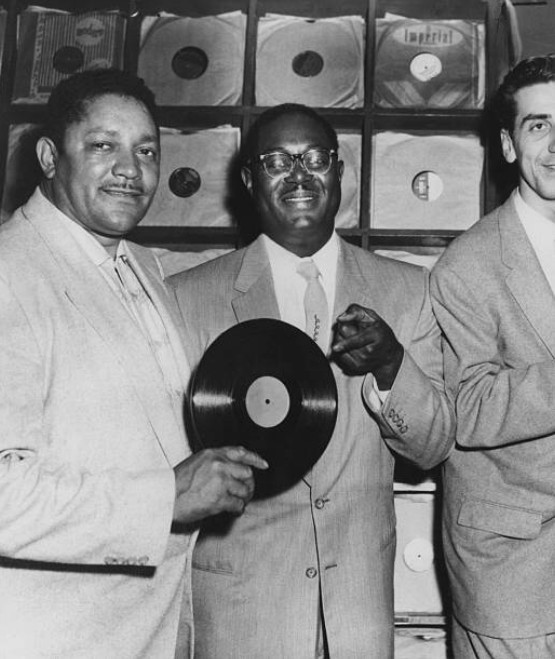
|
Above Left: Signed photo of Earl Bostic. Above Right: At Dolphins Of Hollywood, Los Angeles, California, circa 1952.
(L-R) Record producer and store owner John Dolphin, Earl Bostic, and deejay Dick "Huggy Boy" Hugg.
Maybe check the 3-for-a-dollar record bins for some vocal group records?
1. "I Gotcha' Covered" - Chubby Jackson Sextet - Queen 4101-A - 1944.
ALL TWENTY-NINE ABOVE KING/QUEEN LABEL SONGS played in sequence.
|
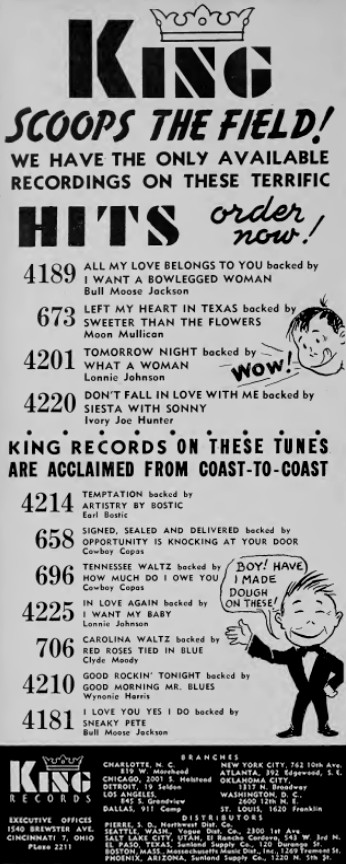
|
Last Update: March 9, 2024
E-mail Me: